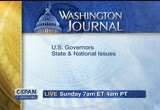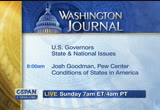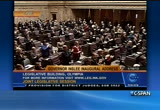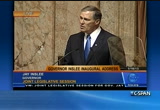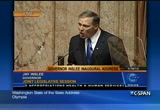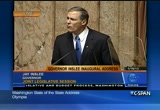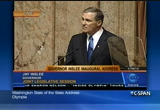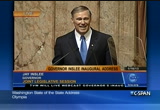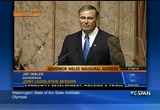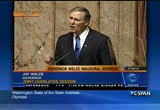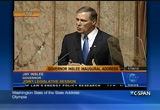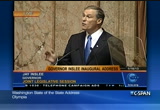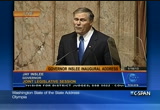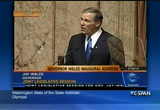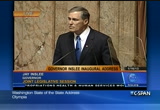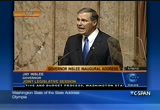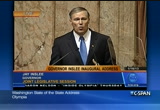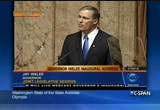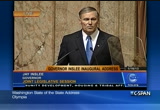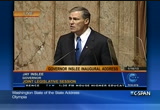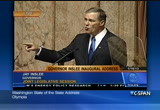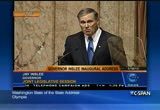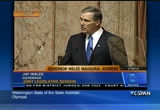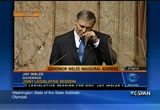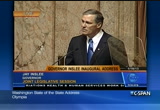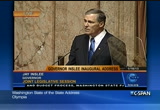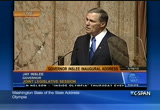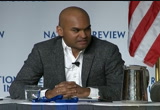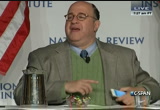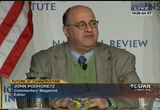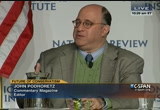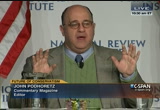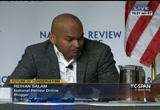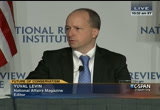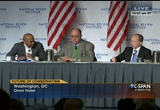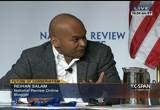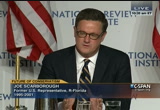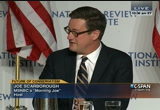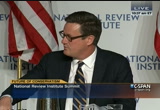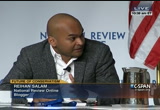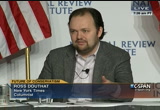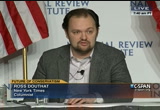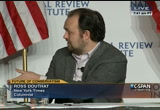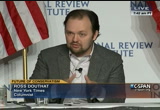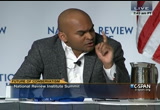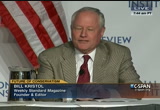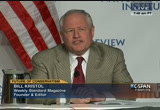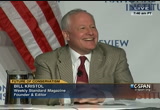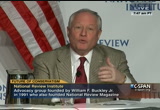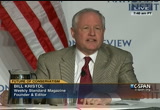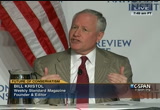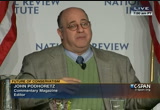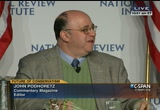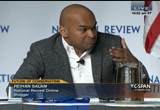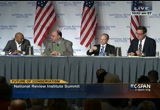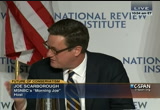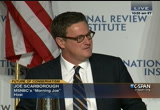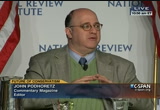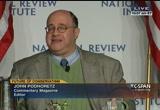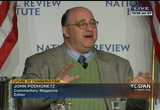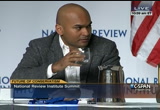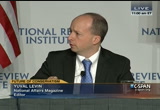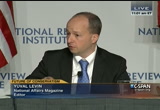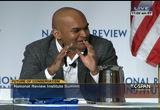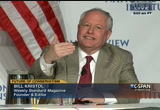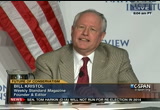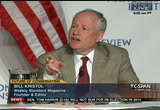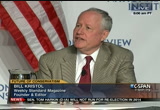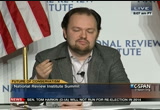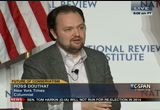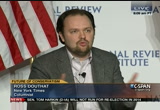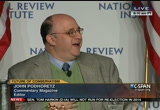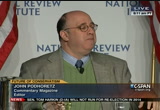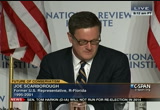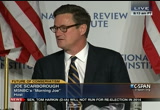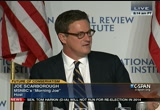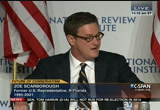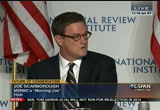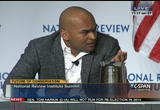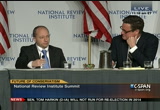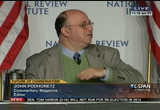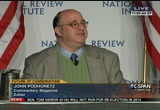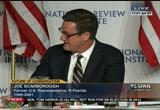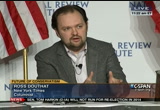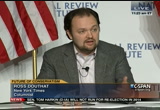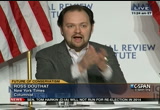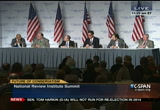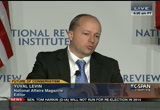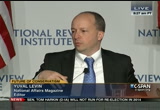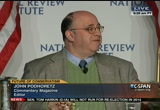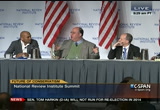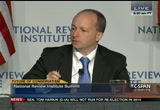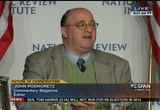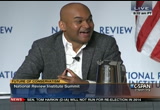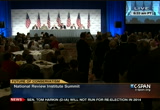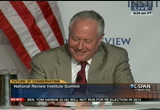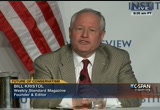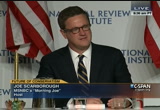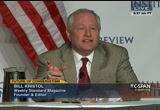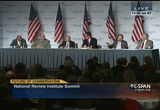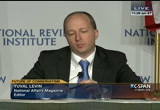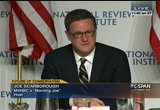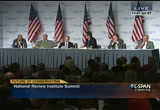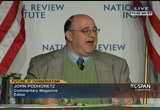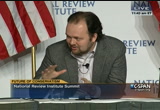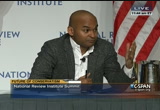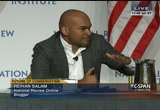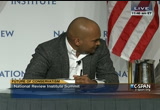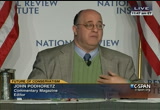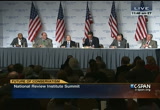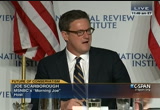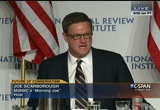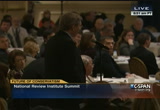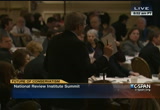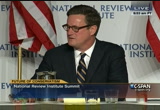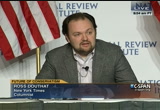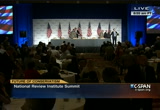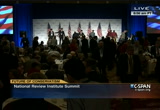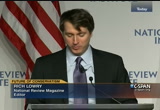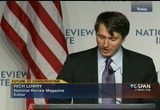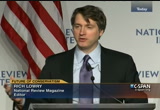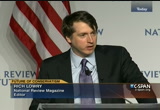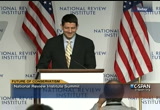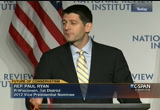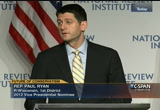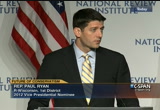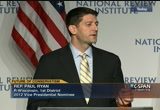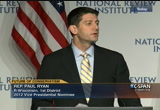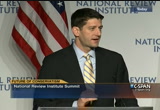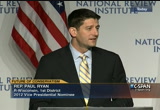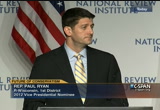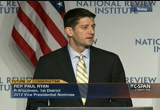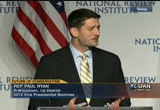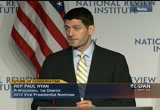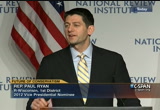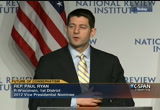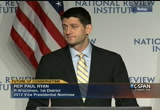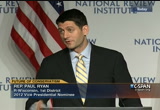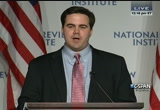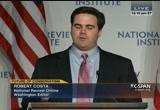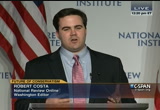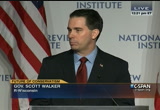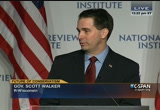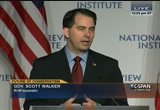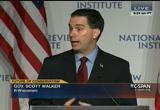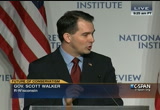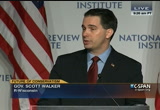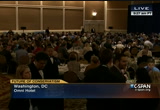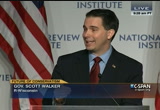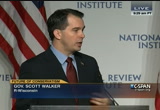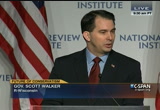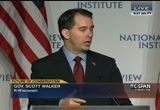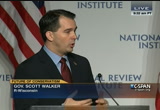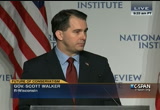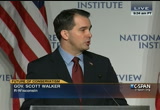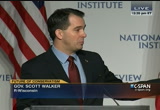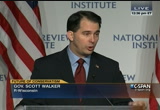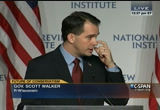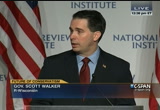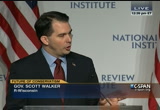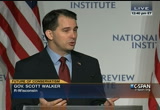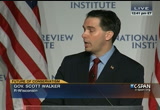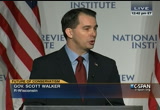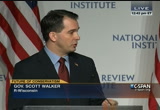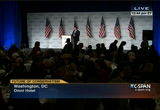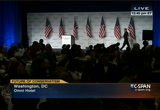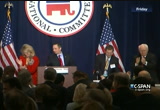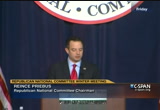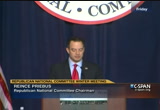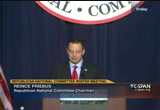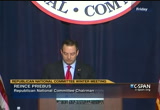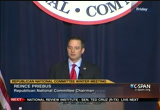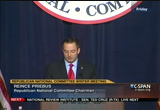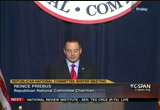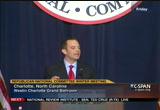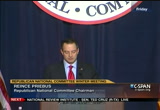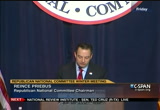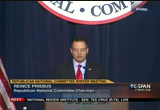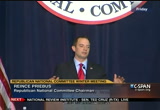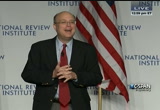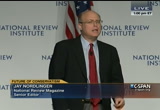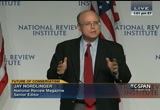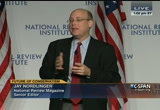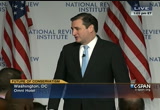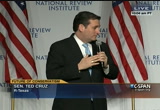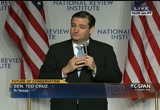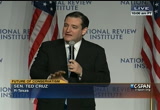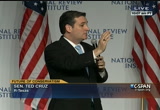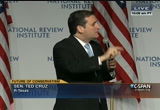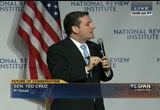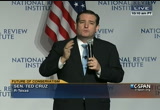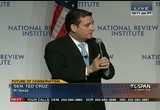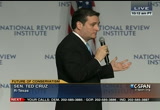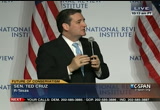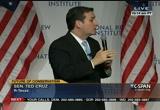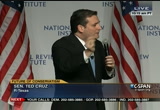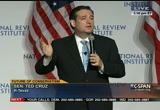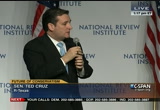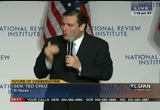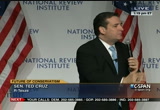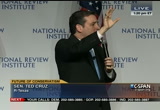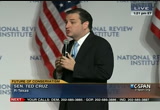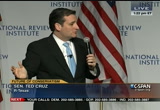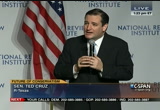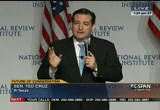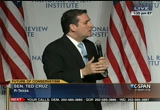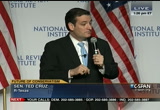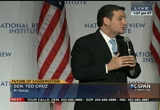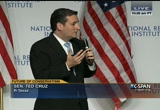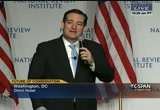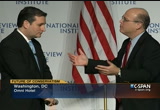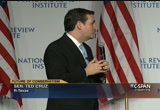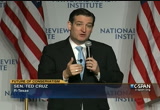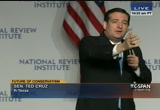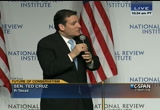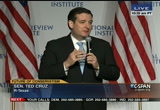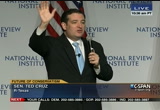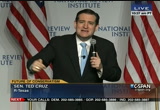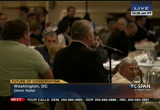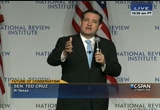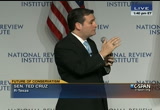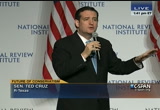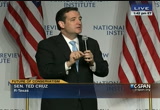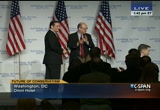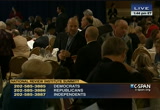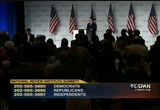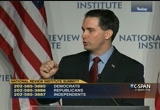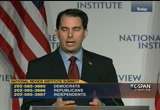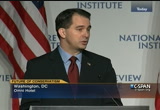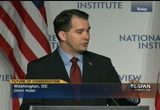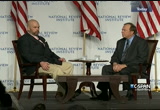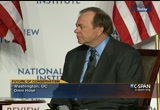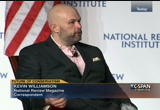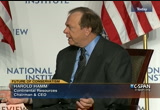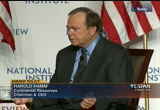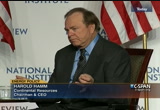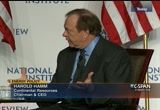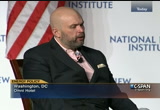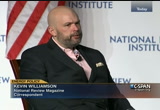tv Washington This Week CSPAN January 26, 2013 10:00am-2:00pm EST
10:00 am
host: will solicit opinions from viewers what they think are the most pressing issues facing their state, illustrate those issues by using clips from several recent state of the state addresses that have aired throughout the month on c-span, and adding facts and figures about the governor's. will also speak to an expert from the pew center our guest will be-goodman. he is a staff writer. we will be talking about all things states regarding u.s. governors, state, and their issues. i want to offend everybody for participating. we will see you again tomorrow morning at 7:00 a.m. eastern time.
10:01 am
[captioning performed by national captioning institute] [captions copyright national cable satellite corp. 2013] >> swearing-in ceremony for jay inslee. the discussion about the future of the conservative movement and a box by texas senator. >> the incoming governor of washington state, and jay inslee, gave his inaugural address wednesday. he takes office facing in nearly $1 billion deficit. climate change and a transfer station were among the states. this video is courtesy of tcw. it is 35 minutes.
10:02 am
>> good afternoon. madam chief justice, distinguished justices of the court, my fellow statewide elected officials, members of armed forces and national guard, members of the consular corps, governor christine gregoire, and my fellow washingtonians. this we know,our world is changing faster and more dramatically than ever before. once in a lifetime events now seem to happen with startling regularity. we've seen the greatest financial crisis since the great depression, natural disasters fueled by climate change, and unimaginable human tragedies like sandy hook elementary.
10:03 am
technology, medicine, and the fundamental understanding of our universe. every day i am left in awe at how much we are able to achieve, and heartbroken over the uncertainty, we see opportunity. and we all feel a profound responsibility to our children and our grandchildren. we have a spirit of innovation here in washington that haswe
10:04 am
are not done. [applause] a new world economy is emerging from the depths of this recession, and while its contours and relationships are not fully understood to us, we do know two things, one. with our uniquely powerful fusion of values and talents, washington state has the potential to lead the next wave of world-changing innovations. two. the world will not wait for us. global competition for the jobs of tomorrow. leading this next wave of growth entitlement.
10:05 am
we must move, swiftly and boldly, to put this recession behind us, and bring forward a unique economic strategy that much." today, i'd like to share my vision of the path ahead. i know that to achieve this vision we must all work together. democrat and republican, house and senate, east and west, to answer the challenges of our age. i have represented both sides of our state, first as a state representative from yakima valley, then in congress representing both eastern and western washington. i want to thank the people of washington for electing me your governor. [applause] i am truly humbled to represent all of washington, and to deliver the change in olympia
10:06 am
you asked for last november. now i would like to do something very difficult to do as a and that is to honor a washington state cougar. you to my wife of 40 years, trudi inslee. we met at ingraham high school and raised our family in a century-old farmhouse in the yakima valley. i'd also like you to meet my three boys and their families, connor, joe, jack and his wife
10:07 am
megan, our grandson brody, and the newest inslee, zoe ann. this is a very special day for my family. in history for many other families. people all across washington stood up for fairness and family in approving marriage equality last november. we should all be proud. [applause] the vote on referendum 74
10:08 am
represents the best of who we are as a state. it should be an inspiration for the progress we can make, towards equality, fairness and justice across all of washington. it has been an amazing journey over the past year and a half, as i've traveled to all corners of the state. i am a 5th generation son of the state of washington, and am proud to have roots in this state that are as wide as theymy family came to this state as fishermen and gold miners. as a single mother working at bartels drugstore. my uncle and cousins build the best airplanes in the world at boeing, my dad was a biology
10:09 am
teacher, and i am proud that my mom and dad worked to restore the alpine meadows of mt. rainier. i am proud of the working people work, having driven bulldozers in bellevue, painted houses in burien, run the business end of a jack hammer, prosecuted drunk drivers, and raised hay in the yakima valley. washington has welcomed many people to our great state from all points of the compass, but no matter when you and your family arrived here, in our souls all of us in washington are pioneers. that is what makes us unique. we push the world forward. we take risks. we take pride in what we do, and who we are.
10:10 am
i look forward to a true partnership with senate majority leader rodney tom and minority leader ed murray, and with house speaker frank chopp and minority leader richard debolt. i want us to collaborate early legislature already to begin need to talk to you about the future of our state. when the people of yakima senti sat and listened as former washington's second century. he said "either we respond to international competition, or
10:11 am
we doom ourselves and our children to a dramatic slide to second-rate status in the world." we chose to answer this challenge, with a unique formula for international success that has made us who we are today, with businesses, entrepreneurs, state government, all working economy was brought low by the gross irresponsibility by those on wall street. as a result we have suffered 4 years of recession, with almost 300,000 people in washington looking for work. too many of our families are on the brink of losing their home. parents lie awake at night wondering how they can provide for their children's future.
10:12 am
but we remain an optimistic state, a visionary state and an innovative state. time has not dimmed and the recession has not diminished our thirst for innovation and our talent for technological growth. we are the most creative, entrepreneurial group of business men and women, scientists, educators and workers on the planet. companies like silicon energy in marysville are leading the world with some of the most durable solar cells ever built. janicki industries in sedro- wooley is driving innovation in aerospace. valve, a software company in bellevue has grown into a worldwide leader in interactive entertainment. and in grays harbor an across- the-board effort led to the re- opening of the paper mill last year, putting 175 people back to work making 100% recycled paper.
10:13 am
i had this to say about washington. innovation is in our genes. [applause] we create. we invent. we build. so now we must go forward, with both high ambition and a recognition that the power of innovation will fuel the next wave of job growth in washington. make no mistake, our top priority today, tomorrow, and every day for the next four years, is jobs. we must build a working washington, capable of sustained economic leadership in
10:14 am
a rapidly changing world. my plan focuses on job growth in seven industry clusters. aerospace, life sciences, military, agriculture, information technology, clean energy technology and the drivers of economic growth and job creation in our state. we must support innovators in these areas with incentives to take risks and bring ideas from dream to reality. tax credit to help early-stage companies to develop andit's worked in other states, and it's something we can do this session. i will work with the legislature to make it more desirable for
10:15 am
small and medium size businesses to hire more people in washington. we must also do a better job commercializing the technologies connecting the dots from the classroom to the laboratory to the marketplace. and no economic strategy would be complete without a transportation plan that facilitates this growth. this session i expect to work with stakeholders that have already committed to a bipartisan plan to build an infrastructure for the next generation. in the next ten years, our population will grow by approximately three quarters of a million people, but we will
10:16 am
not be adding one more square inch of dirt. to honestly address our recognize that creativity is just as important as concrete. i want us to turn our innovative spirit towards crafting a transportation package that includes roads, trains, light rail, buses, bike routes and other modes of transportation. we need ways to free capacity for freight and commerce, and rethink how we do the business of transportation in our state and how we use our transportation infrastructure. become part of the culture of olympia. i heard a clear and powerful message on election day. the people of washington state
10:17 am
are tired of a state government that doesn't change with the times. they expect me, and all of us here, to be as innovative as thesince the recession, the debate over the state budget seems to be stuck in the movie "groundhog we revisit the same untenableit's time we made it to a new business. with authentic, courageous principles of lean management to all of state government, following the lead of boeing, virginia mason, and a growing number of state and local governments.
10:18 am
we will provide efficiency, effectiveness and transparency. we will introduce performance metrics where it counts, giving us the data we need to fix what's broken, cut what we don't need, and replace rhetoric with quantifiable results. but this effort is about more than measurement. it's about instituting a culture beyond my administration. moving forward, all state will measure success by the results we produce, not the money we put in. second, we will know our customer and what they value. third, every agency will adopt a unique process for continual improvement that engages our state employees. change is coming to olympia, and i want all state employees to be active partners in it. i know how much you have sacrificed. you are on the front lines, figuring out how to do more
10:19 am
with less just like every family in washington right now. agents, and we will need your ingenuity and dedication more than ever. i am serious about reform. taking action to transition to a quality improvement, employee engagement, and clear accountability. and to honestly address our budget problems, we must admit the difficult truth that the road to a balanced budget, and a fully-funded educational system, runs directly through health care reform. this means investing in
10:20 am
preventative care, and aligning incentives with patients to encourage healthy lifestyle choices. king county is already doing this, and it is working. we'll improve the health of all of us in washington, as we move from "sick care" to the true health care system we deserve. we need to leverage our medicaid and state employee health systems, and engage providers, carriers, and community clinics models and health care delivery systems that incentivize quality over quantity. effectively implementing the affordable care act will save us money, by removing the hidden tax of hundreds of dollars paid monthly by all of our state's insured citizens. we can do this, for the health of our family and the health of our economy.
10:21 am
when we make our health care system more efficient, we lower the cost of doing business in our state. the states that get this right will have a clear advantage in recruiting and retaining the jobs of tomorrow. this session, we must make sure washington gets this right, first. we must also protect the quality and choice that we expect from a health care system that works. washington women need the freedom and privacy to make the health care decisions that are best for themselves and their families. that's why i look forward to the legislature sending the reproductive parity act to my
10:22 am
desk, which i will sign. let's get this done. for washington to be successful, our schools must all work together, but before we continue, i want to take a moment to honor the courage and heroism of public school teachers, educators, and all of our public employees. the tragedy at sandy hook elementary school in connecticut showed us all that our nation's their students above everything, even their own lives. you may have heard the story about the parent who was in the
10:23 am
principal's office when the sounds of gunshots began in connecticut. that parent said she ran to get under the nearest desk, as most people would have done, but the educators in the room ran another way. they ran toward the sound of the gun fire. they did not return. it is my fervent hope that the country sees the sacrifices made at this one school, in this one state, as entirely consistent with what teachers and educators do every day, in every school, protect the children in their care.
10:24 am
10:25 am
lethal combination of untreated mental illness, evil intent and easy access to deadly weapons. and our schools will be intolerable, and in the coming weeks i will work with the legislature to address this crisis responsibly. i don't have all the answers, but i know the sooner we reject the extremes and embrace common sense, the sooner we'll be able to get a public health solution to this public health problem. and common sense tells us that this solution will involve
10:26 am
mental health and keeping guns out of the wrong hands, while respecting the right for my son to hunt, and my uncle to defend his home. all of us have an obligation to our families, to ensure their safety and to make sure our children are prepared for the world, and i am proud to live in a state where the education of our children is enshrined as the paramount duty of state government. of >> we will leave this did take you live to the hotel in washington, d.c.. let coverage from the national review institute summit. it was founded by william f. buckley jr..
10:27 am
or the next 90 minutes we will hear from bill kristol and others. >> you wrote a book called bush country in which she celebrated the achievement of our 43rd president. he is a guy that thought deeply about immigration reform, poverty, and trying to craft a middle class agenda. now a lot are thinking the same thing. do think republicans were too quick? >> sorry. i was tweeting. yes and no. politically, republicans
10:28 am
distance themselves from george w. bush because it was the thing to do. numbers do not lie. he became very unpopular. parties to not to embrace figures and politicians to become unpopular. my view is that a lot of distress over bush' domestic agenda from which they fled the gangnam could 2005. is that an ancillary -- it had been an ancillary result of failure to defend iraq and have a favorable recognition. >> what might have been a successful policy agenda. >> i think the entire country stopped listening to president bush which would be good for the country when it lost faith that
10:29 am
he was managing the war effectively. he found it more difficult to get hearings on some of the issues. a lot of people on the right to it came at bush on a lot of these domestic issues. they were feeling extremely distressed about what was going on in the war and did not want to turn on the war. we have troops in the field. this seems like a noble endeavor. they were angry at him for throwing them on the defensive for the prosecution of the war. as a result of the republican party getting thrown on its heels of immigration, in 2006 i
10:30 am
published a book on hillary clinton. >> we're right to come back. >> let me finish this point. the morning that i, i had 150 radio interviews. the book was being sent off. i did eight interviews the first day. every single one of the interviews i came on the conservative radio station and i said i am here to talk about my book. the conservative radio host would say "and do not want to talk about that. i want to talk about immigration. what's the matter with the president? what is going non?" this is posted be a friendly audience. they hated hillary. no conservative wanted to talk about the democrats. the wanted to distance themselves from bush.
10:31 am
>> you are the person i turn to when i am looking for optimism about the republican future. when i think what on earth are they doing, he makes sense of it in a way i appreciate. one of the republican governors that a lot of us are looking to is gov. bob be gentle. he makes a terrific outline of how it should be the party growth rather than austerity. what other policies should be backed by the parti? he turned to term limits and the budget amendment. does this reflect a broader
10:32 am
exhaustion. we have young republicans who are talking about a new idea. we keep hearing these retreads. what are your thoughts on that? should we fall into despair? >> let me make you feel better again. it is not quite right that we're only during retread. for the last few years for all of their difficulties, and they have been a time of some some real creativity on the right. the republican party really has moved pretty dramatically in the right direction and is learning about how to speak of where it has moved to which is always been a problem for conservatives. in terms of talking about growth and prosperity which is what conservative should be talking about, republicans have to be the party of growth and middle- class prosperity. even the louisiana governor is better than he says.
10:33 am
it may be that when he talks about it he incidences' by talking about the balanced budget amendment -- he ends his senses by talking about the balanced budget amendment which helpfuwere helpful in 1993. if you look at what he's doing in louisiana, he is thinking when the time that globalization is bringing pressure on working class voters, at a time when the economy is going through a very complicated difficult moment or is not there had to get back to growth, he is thinking creatively about how to use the strength to build on its weaknesses. at the national level that is what conservatives have stated. the policy agenda that has to come is not fully worked out by any means. the questions are being asked,
10:34 am
the direction of thinking has been helpful. it is different from what they were saying six months or a year ago. the focus is turning to the right place. that is not mean we have the right solution or it will persuade the public. >> i want to bring up something that my friend john mentioned a few minutes ago. part of what i heard was some of the difficulties we encountered during the invasion of iraq and the occupation or things that damage the republican brand in a deeper way. you have a lot to say. you have a thing or two to say
10:35 am
about a number of other issues. is it your view is that republicans need to get right on foreign policy and that is a core issue that is affecting everything else? are you seeing it as a garnish on the salad? not essential. >> as a party, we need to have john and bill on that wing of the party. we also need those who acted and soggy world like we did -- and saw the world like we did in congress or we believed in a restrained foreign policy. that is part of the balance. did you go back and look at what william buckley said about iraq. he said it was not a conservative of venture. there's nothing conservative
10:36 am
about believing that you're going to be able to change the way people live and think in other countries that do not have a democratic background. i think the bigger problem really has to duet the domestic side of things. as long as republicans have a coherent foreign policy, i think americans will go along with its. the bigger problem from the bush era came that he was a big government republican. we had $155 billion surplus when he came in. when you that we had a $1 trillion deficit. our national debt doubled. we had a seven million-dollar drug benefit plan. george w. bush did not veto a single appropriations bill. when you say this and some of going down the list, some republicans will get defensive.
10:37 am
i like bush. i campaigned for him twice. i love john roberts except for one decision. george w. bush is some great things. i will tell you what. he completely muddied the brand when it came to what was our core issue, that we are a party of small government. if you give the american people a choice between voting for a big government republican or a big government democrat they will vote for the big government democratic every single time. what george w. bush did over eight years is destroying our brands. he is a conservative guy. george w. bush is no conservative. >> you really know how to work the crowd. i am impressed. >> they believe we should be
10:38 am
the party of small government. >> i believe that rothko offered an article in the late bush years saying the main public bush's but he was a conservative. joseph the only conservative that believes that republicans should see the party is small government. you have a different take. the you enhanced the believe that there ought to be a new consensus. i want you to talk a little bit about that and the fact that in the 2012 election you have said that it is the first election in modern america in which social conservatism may have been a liability for the gop rather than a strain. that is pretty big coming from me. >> i cannot believe a guy from
10:39 am
the new york times would say something like that. >> no. sank it is lovely to finally be on a panel were there is a -- i was saying is lovely to finally be on a panel or there's someone more liberal than me. let me start not by sticking up for big government conservatism but sticking up for george w. bush's it sent to solve a reporproblem that the republican party has more so today. he does not about to talk about the issues that the american public are not interested in talking about. if you look at the reagan coalition and the victories of 1980, 1984, and so on. they were built on an ideological argument about small
10:40 am
governments, the limit to state action and so on. this was also about policies addressed to specific points. if you were not that ideological conservative leanings american, what were you concerned about. you were concerned about inflation and economic stagnation. you are concerned with the fact that prices were going up. it your paycheck was not growing. we're living there a generational crime wave. you work consumes about the soviet union. >> now what are people concerned about that health-care costs.
10:41 am
to a lesser extents one economic growth is stronger, maybe they're worried about issues related to the environment. these are not issues that republicans like to talk about. they're not issues that are good at talking about. this is where it emerged in the late 1990's from a time when bill clinton had been something republicans up and down washington. the whole point of bush was to craft a republican party that had something to say about education. something like the prescription drug bill was too big and should have been paid for.
10:42 am
the republican party will never give back to the wilderness. we have to keep our brand pure and make sure americans and no where the party of small government. americans are confident that the republican party is the party's small government. they did not vote for the republican party. it is possible that he should not nominate mitt romney next time and get a true conservative, if you look at opinion polls, barack obama won the election because people thought he cared about people like us. that is a touchy-feely kind of sentiment. it is the kind of sentiment that republican politicians have to deal with. he was better at dealing with this than any leader of the party. >> people have seen their wages
10:43 am
fall over the last five years. how we're different. we will say we need to be the federal government program. we're line to give the more cash in money. this is how you are going to get this back to work. that is how we will get your child into the college they want to get into. we have to make our core message relevance and middle- class americans. the reason why romney lost, and you can look at him, it's a three minutes of listing to mitt romney talk about economics to realize he did not get it. >> there is one guy on this panel who spent much of 2011 and 2012 maneuvering desperately to try to get absolutely anybody to
10:44 am
jump into the presidential nomination fight. the n -- the list was in less. -- was a list. i want to ask you. you try to get an analyst parade republicans to run. do you think what we need is a leader? is a leader enough tha? do you think a leader is what we need to snap back into fighting form? >> it is great to be here on this fair and balanced panel. i said this was my idea of the
10:45 am
perfect spectrum of opinion. bell is here -- i was here a couple of times. we had 12 years. i was part of that. republicans were about 170 seats in the house. i remember how important that conference was to cheer people up and give them a sense there was a feature more also having debates about what the future would be.
10:46 am
one thing they have done is planted the flag for conservatives. it also has featured many debates over what this should be. the thing this is healthy for the conservative movement. i do not believe people should shy away from taxable debates. a leader would be good. would you like to have a strong leader or not? >> within limits. >> come on. >> is a leader all we need? >> it is not all we need.
10:47 am
there are serious issues. >> there are several conservative explanations of what happened to thousand eight. there is no republican explanation for why the financial meltdown happens under a republican president after 12 years. one big problem that he had was there was no clear explanation of what most americans had. the worst moment economically was 2007/2008. they were better off by 2012.
10:48 am
that is what did the most damage. the financial crisis in 2007, 2008 remains here. i am sure republicans and not have a clear explanation for it. here's one last example. dodd/frank, a very bad legislation. the agenda was really coming only after obamacare and the stimulus. the published articles against it.
10:49 am
he won the house. republican house has no legislation to repeal dodd/frank are to replace dodd/frank with a sensible financial regulatory structure. what does that say about where republicans were in their agenda? you need to have some regulatory structure. we need some answers for what he would replace dodd/frank with. a lot of conservatives have blamed the american public for what happened. if you are a member of the public says obama's is terrible, what is your replacement? we do not want to get into that right now. that is not a serious government party.
10:50 am
>> i think there is a movement issue. the conservative movement came into fruition with rage in 1980. as a governing force, it is now three decades old. a lot of what goes on in these circles as a result of three decades and a lot of groups getting involved is a choking off of a lot of conversation. if you start down the road, you start talking about what is the kind of regulation you should have. you trigger a new regulation. it becomes a no-no. someone can turn to you and say you are just a big government liberal wanting to regulate small business. there is a problem with three
10:51 am
decades of movement for thinking that into creating dead ends, particularly when the road needs down for the future. if we think forward when there is another series of national debates, if it is the case that he cannot have a serious conversation about what replaces health care, what replaces dodd/frank, how the levers of government are to be used by republicans, then you're not going to be able to taught. -- talk. you'll not be in a position to talk to people who come to with the same in the logical framework that you do.
10:52 am
>> have a question for you in for joe. one issue is when you're talking about being a party of small government, you become a party that is all sticks and no cure it. -- and no carrot. when you're looking at the reagan vision, they seem to be offering in non-0 some vision of the future. given the scale of deficits, you talked about why republicans should not fight every tax increase to the nl. how do you avoid becoming a party that is all sticks and no carrots? >> you cannot do that. ronald reagan was quoted as
10:53 am
turning to people saying we need another wave of cuts and by this time reagan had realized that the country had had enough for a while. he said i'm the guy that always wears the white hat. you want to elect a leader that has a presumption that people on the local level can do better than people in the state level. we will give it to the federal government and let them handle it. >you have to be pragmatic about it.
10:54 am
you have a conservative court. at times you have to compromise. conservatism requires the ability for realism. yet to go up to defend ronald reagan. conservatives were enraged. time and time again he had to make tough decisions and is based not like. reagan did not care what the heck they said about him in the new york times. he said he was insufficiently conservative. there has to be a balance. your focus has to be on winning. our focus has not been on winning. there's one reason why we have lost less -- five out of the last six elections. it has to be about what john is
10:55 am
talking about. i have been a tax increase absolutist. i believe raising taxes is a moral -- immoral of people giving more than 50% to the government. this us to make your heart swell. he raised the question. why should we keep putting our political mess on the line? to make billions. >> if the republican party is no
10:56 am
longer the party promising middle-class tax cuts, there's not that much room to give up. what is the republican party offering other then discipline on the spending side. what are you giving to me? the economy absolutely blew up in 2008. >> this is a real distinction between the right and the left as far as republicans and democrats are concerned. the conservative movement believes in actions that are broadbased. if you're going to cut taxes, you cut them nationally. you do not target. this is part dearly chair of the
10:57 am
state and local level. targeting is where giveaways' take place. it is where you play and figure out ways to appeal to people. if you are at a time when broadbased tax cuts are no longer a lira stood -- and unrealistic reality, the only way to get past where we arnelle is their economic growth. it is the only solution to every feeling government coffers -- refilling government coffers of the money does not come directly from the taxpayers. here is where it gets interesting. this has widely been tax cuts.
10:58 am
a series of government to reforms that make policies more coherent, that a law on the tax side in health care reform side. you are in a position where the economy and locks are removed. the interesting problem is that if it is time to improperly it is there. he may benefit. this could happen. there could be a big economic recovery. maybe you have the interesting aspect that it is good for everybody. it would vindicate a lot of our
10:59 am
ideas. it solidified the sense that obama had claimed america. >> this made a strong case for targeting. you have been writing for years numbat while the democrats have their various pressure groups that republicans and conservatives should think hard about parents. we should perhaps target more policies toward the interest of the parent. >> targeting in the sense that it is vital to explain why a conservative policies are good for them. the idea is not that we should think about what we're going to advocate.
11:00 am
this is not only impossible for conservatives, it would be very unwise. let me start by saying that i think the danger of choking off the base is vastly overstated. the fear of that is what causes a lot of conservative leaders in the republican party to stay away from a lot of new ideas. when you try, it turns out there's a vacuum, and people are hungry for new ideas. when you try to argue for what our growth and believe in prosperity and prosperity through growth requires a way of thinking about today's problems in a new way, there is a willingness to it. we've seen that on the entitlement front. if two years ago, you had said that every republican member of congress would vote for support
11:01 am
of medicaid and a republican candidate would have run for president on it, you would have thought it was insane. an argument for it was put forward in terms of a conservative way of thinking about where the economy is going. there was a vacuum -- a huge vacuum -- and it was filled by the right kind of idea. there's a lot of room for that in a lot of different areas. it has to begin by thinking about what economic growth looks like now. republicans have got to be the party of growth and prosperity. the fact simply is, i think, that the barrier to growth today is not high marginal tax rates. the barrier to growth today is the profound inefficiency of our economy. that is, to a great degree, a function of government policy. it is and inefficiency of the public sector and those private sector -- those elements of the private sector that are most dominated by the government -- health care and education. it could be fixed by a series of
11:02 am
different ways of thinking about how the government ought to go about providing the sorts of benefits it provides, providing the kinds of services it provides, approaching the economy in general -- that strikes me as the obvious way forward, and it carries with it a huge growth dividend. if you ask what we are offering the public, we are offering the public a lower cost of living, offering rising wages not crushed by health care costs that rise even faster. we are offering the public a more affordable middle-class lifestyle. that is done by thinking about growth, not by thinking in the sense of where we can give goodies in particular. >> bill, you have been around the block, and i think that implicit in the conversation so far -- [laughter] i mean that respectfully. there's an implicit question you hear from a lot people, including some of the more fierce critics of the gop, was still identified as conservatives, about the idea
11:03 am
that we need a real fight within the party -- who still identify as conservatives. now, there's this real question about weather or not with the republican party needs come before it can have real revival, is a knock down drag out fight over some basic principles -- whether or not what the republican party needs. do you think we need that kind of conflict? >> no, i do not. we do have obviously an honest debate, but i think there's a lot of receptivity and new ideas in how you can have a growth agenda that is a new growth agenda because we are in a different circumstance than we were in 1978 and 1979, and i am still for lower taxes and tax reform, but it may not be as high on the list of things that have to be accomplished as
11:04 am
taking parts of the economy which are bloated and great -- put great burdens on middle- class families. i feel like i should stop now because i'm exhausted. i mean, i've been around the block so many times i can barely talk. you are probably surprised i have not fallen asleep of. . -- fallen asleep yet. in some ways, you just got to -- one does not know what will happen in the future. this meant a discussion can sometimes become a little bit -- this meta discussion can sometimes become a little bit too meta. i am guilty of this, too, but everyone has become a little bit to tactical, a little too strategic. i would say by implication of the conservative movement, the
11:05 am
purpose was to stand before history and say stop and no one has much patience for those who so urge it. i think there is a place for that among conservatives and republicans. i did argue that taxes were not the right fight to fight, but there are times when one just has to say -- look, this is wrong, and this is foolish, and we do not know if the odds are 60--- that we will win or -- 60/40 that we will win or 80/20. i am for fighting fights -- i
11:06 am
wrote this in the context of women in ground combat units where i have been very distressed by a bunch of republican senators in the last 48 hours to have decided we had a war on women in charge of the campaign in 2012, and we are not going to oppose something that is literally not, i think, an extremely damaging -- [applause] extremely damaging in all kinds of ways. there are many good arguments against it. but politicians sometimes over think these things, and they tell themselves they cannot fight this fight because we did badly in 2012 on this, and cannot fight this fight because we have a constituency that does not want it, and you end up tying yourself into knots. i think we should encourage the possibility for political entrepreneurship over the next year or two or three. jack kemp was not popular. he did it from the house. he was not on the house ways and
11:07 am
means committee, which is the committee that writes tax policy. the deeply resented him telling them what republican tax policy should be -- they deeply resented him. i am all for having these discussions and debates, and we have to have serious discussions on the merits of these issues, obviously, but i also think a little bit more occasionally throwing caution to the wind, a little bit more saying on this issue, we will stand here and make the case and see how it turns out three or six or nine months from now i think is what sometimes standing -- >> whenever i think of throwing cautious -- caution to the wind, i think of ross douthat, who i know has been waiting patiently. please come throw caution to the wind. >> one of the interesting lessons of the paul ryan phenomenon is actually if you are a republican politician in washington or in the country as
11:08 am
a whole, there is a real percentage in being associated with serious, substantive policy ideas that other politicians are not talking about. one of the biggest problems the party has -- i disagree with you a little bit on the standing before history thing because i think that is sort of all the republicans did for two years of obama. it goes to the question occurs -- you contain multitudes, so you are circling, but your point about -- >> [inaudible] >> yeah, but your point about not having an alternative to dodd-frank. republicans were very good at saying there were going to make obamacare obama's waterloo and stop these things in their tracks, and when they did not, they did not have something else to say, but one person did have something else to say was paul ryan, and he was rewarded for it with all levels of media attention, massive popularity within the republican party, and
11:09 am
the vice presidential slot on the national ticket. when i look at other rising stars in congress and around the country and i see them talking about the idea of new ideas without talking about the ideas themselves, i say, it isn't the lesson of ryan that if you talk about the specific ideas, there's more to be gained than lost? this is my personal biggest disappointment with the republican party of the last few years. where are the policy entrepreneurs in the party itself? i think conservatism had a serious policy problem, a serious intellectual problem four or five years ago. it was the end of the bush presidency. everybody was exhausted. people had tried things that worked, that had not worked. there was not a lot of fresh policy. five years on, if you pick up "the weekly standard," "national
11:10 am
review," you can find not just the -- >> [inaudible] [laughter] >> i did not want to risk your last name. it is such a fraught issue. i do not think we have just the building blocks of a conservative domestic policy agenda. i think there is a conservative domestic policy agenda, but there are not any politicians interested in talking about it. >> by the way, it is not just that, it is also the question of picking a fight. there's also the fact that one of the distressing things we saw in 2012 was a kind of, "look, hey, squirrel" approach that democrats took with republicans that even if it was not conscious, everybody fell
11:11 am
four -- for. nobody -- a woman claimed she did not get to testify. nobody knew who she was. she was a georgetown university law student with an agenda about free contraception. suddenly, this person out of nowhere who was supposedly denied her right to speak before a congressional hearing, becomes the most famous person in america because republicans sought a bright, shiny object. "liberal feminists are attacking us for having done this and who is this person anyway? what is going on?" to the point where she ended up speaking at the democratic national convention and that entire preposterous incident becoming an emblematic moment in this war on women fight that i'm afraid you have to say if that
11:12 am
war existed, democrats won in 2012. >> i'm a little nervous given that there are no women on the panel, but i wanted to go to you, joe, to pivot off of that. i think you are one of those on the panel who believe that maybe the republican party needs a message that is a little bit more in tune with a country that seems in the 2012 election to have changed its views on a lot of core issues relating to what we might call traditionalism, cultural conservatism. i want to hear your thoughts about that. >> we just need to be smart. when i was on the campaign trail, i did not obsess over right to life. i was a social conservative in all areas. with the primaries being focused on -- the media discussion is
11:13 am
focused on contraception, an issue that was settled in 1965 by the supreme court, when we focus on abortion primarily, taken care of in 1973 by the supreme court, now the guns, the outline is laid out very clearly by scalia in 2008. sometimes we get in our way of what our message should be. i do want to say, though, and i think i have heard two things that i think are really exciting and important for all of us to focus on. one is what john said -- i think the debate has been stifled. it has been stifled because we have created this conservative group think over 30 years that has become more and more narrow. it would allow all of our primary presidential candidates
11:14 am
being asked if they would take eight -- a 10-t0-1 deal. >> is part of the group think floating reagan and buckley at every occasion? >> let me finish. the problem is liberals believe that you manage the government from the top down. we believe you manage the economy from the bottom up. we are managing our ideas from the top down. you want to talk about why everyone is talking about sandra fluke? it is because there are not 20 or 30 proposals out there like the war in 1993. i decided to run for congress in 1994, and in 1993, i talked about things like this, and there was so much excitement because there was not just one
11:15 am
talk radio guy that everyone listened to or one news channel or one website everyone went to. you would get a great welfare reform idea from michigan. great crime ideas from wisconsin. newt gingrich, along with trent lott's, along with connie mack, along with jack kemp -- they were turning ideas out every single day. in 1993 and 1994, when i ran, i just plugged my campaign. it was him doing the very things that ross is complaining about that this republican party in our house does not do right now that gave us the majority. everyone in 1993 going into the rnc had a sign that said "think
11:16 am
majority." we just laugh. we have not been the majority in my lifetime, but we got it because we had ideas. we had ideas on the house level. we had ideas in the state legislatures. we had ideas coming from governors, and democrats did not stand a chance. i was the first republican governor in my district since 1873. it is a rough damn district, but i won because every time i would go out, they would ask me is not a question about education. i would talk about term limits. i would talk about what they are doing in wisconsin. it is unbelievable. i would mix that in with the "wall street journal" editorial page -- were you writing for
11:17 am
commentary in 1994? and i would listen to rush when i was driving from the event to event -- from event to event. it was not just talk. it was legislation. you ask me about budget, i would quote john kasich. you ask me about budget, i would uot -- quote kempt. . we do not have that today because there is such a stifling group think that you go a little bit out of the way -- >> you obviously disagree with joe. >> [inaudible] >> you get hammered. it is important that you get hammered. >> you are saying when you go to the state level, when you read
11:18 am
national affairs, you have a rich vein of a ton of ideas, so what is the problem? >> in part, what you are describing is actually top down, not bottom-up. it was the leadership in washington for the most part that gathered up these sorts of ideas from the states, from people in washington, from people around the country and made them available to people like you're running for congress. >> but the idea is they were bottom-up. they came from the states. they came from legislative laboratories. >> they came from the states, from congress, from think tanks not far from here, the same place they are coming from now. if you look at what bobby jindal is doing in louisiana, look at what is going on with public employees in wisconsin and new jersey and ohio, there are a lot of ideas out there, and there are also ideas that are just ideas being proposed by people in the think tanks. >> how does that translate to guys and women in the senate and
11:19 am
house? >> that goes to your point. there is paul ryan, who takes the most fearsome comprehensive look at a difficult issue and becomes famous, respected, controversial, important, and the vice presidential nominee, and it is true that there were more -- many more politicians in washington in 1993 who were fluid with not only ideas but the actualization of them and the forms of legislation and policy proposals that i think is the case now. it is a problem with two routes -- one is there's a great many members of congress and senators who have been here a long time and have sort of coasted -- you do not know who they are. they do a lot of constituents service. then you have the new breed, the more ideological, a tea party
11:20 am
years -- tea partiers and others, and they come with a governing agenda. this is what bill was attempting to school republicans on 20 years ago. politicians cannot come to washington to do nothing. that is an oxymoron. they can come to clear brush or redirect policy, but there seemed to be confusion on the part of a lot of the populace excitement in 2010 and 2011 that the best thing for them to do was nothing. the first debt limit 5 in the summer of 2011 -- i think back to a lot of red states, and this proposal that somehow with the united states should do was to fall, and this was a really exciting moment because what we should do was to fall on our debt and have a big crisis that
11:21 am
could lead to change -- this was not a rational response to a particular political moment. just as i do not think it was earlier this year. politicians have to act. they have to work. they have to do things. >> when they do that, they inspire. the reason i decided -- again, 29-year-old guy who had never been in politics. i decided to run for congress, to quit my law firm, just take the jump when i saw john kasich, who sounds boring, debating for three hours with tim penning his plan to balance the budget. i said if what you want to do is come up and do nothing -- >> this is very dangerous for a moderator to hear "that is exactly right." >> we sound pessimistic, but in
11:22 am
certain ways, we are being kind of optimistic. the implication shared by most people on this panel is there are a lot of ideas out there, that if you get the right leaders with the right ideas, the republican party will make a comeback and so on. i feel that way some days of the week, but i want to throw out another possibility which is that there are deep structural forces in american life that make this kind of come back extremely difficult. you have also been talking about what bobby jindal has been doing and we have been talking about state-level reforms. one of the big problems the republican party faced in 2012 was there was confusion about how the battles the party had been fighting and winning at the state level matched on to political debate. a lot of republicans said it themselves, "look at what scott walker has been able to do. look at what chris christie has been able to do. we are picking fights with big,
11:23 am
powerful liberal interest groups in purple or blue states and winning them, so let's do the same thing at the national level." this is the same reason we had a lot of republicans telling me we were going to win wisconsin. we would do the same thing again, have the same kind of turnout, but the reality is that the problems that the federal government faces right now are very different from the problems that state governments face. state governments are dealing with a problem of special interest groups, right? public-sector unions, groups that are very powerful, but you can isolate them politically, even in a state like new jersey or wisconsin. you can say, "look, average voter, these organizations and institutions are a threat to the common good, and they are taking money out of your pocket." it does sound cynical and non- idealistic, but ultimately, political debates are about who
11:24 am
is taking money out of your pocket, who is getting a better deal, who is getting a worse deal. at the national level, we are looking a structural problems related to entitlement. the problem is that to reform these programs, there is not a carrot that conservatives can offer to sell paul ryan's entitlement reforms. they are a stick -- necessary, maybe, but they are a stick. you cannot isolate medicare recipients. this is why conservatives are much more enthusiastic about talking about medicaid, for instance, than medicare. medicaid should be reformed. proposing block grants, these are often positive and serious proposals, but again, conservatives are better at isolating this particular problem of medicaid recipients being poor people, and it is not only poor people, which is sort
11:25 am
of why it boomeranged to some extent. the reality is that to reform medicare, you have to take things away from everybody. >> we have been having the larger makers and takers dialogue for some time. you can divide the adult population into 30% that is college educated, 10% that did not finish high school, and 60% somewhere in between. one of the really alarming social trends has been when you look at marriage and family formation, that big middle of america is starting to look a lot more like those folks in the 10% the did not finish high school. less marriage, and when there are marriages, they are less stable. one question is that when you are looking at conservatives -- we have a lot of smart policy guys thinking about how to reform our bid for institution, but when you do not have a civil society, when you do not have
11:26 am
that kind of robust foundation for this kind of -- families that are able to pursue economic progress on their own, then there is a really, really good question. how the conservatives talk about that? there's no policy that will make young people get married and stay married. >> family friendly tax reform. [applause] >> didn't you guys write a book on that? >> let me say first, i agree with the problem russ is laying out, but i do not agree with the way he is laying it out. i think there's more room at the national level to talk about carrots, not less. states have to deal with the national economy. a governor cannot say, "i'm going to create economic growth," because the problems we are facing are created by a large extent by health care costs, education costs, and the global economy. at the national level, it is easier to say that with the
11:27 am
right sort of, for instance, health care reform, and i think medicare is properly understood in that context as much as in the context of we are running out of money, it is possible to reduce the cost of living in the middle class and a lot. it is possible to allow wages to grow much more than they have. we just do not do that. we talk about entitlements in the wrong way. >> but the appetite for redistribution is bigger in a society that is fragmented. >> yes, and i agree. i certainly agree that that is the essence of our longer-term social policy challenge. the fact that we are increasingly -- when you look at how people live, we just do live in two different countries. i think that charles murray's book last year was a very powerful way of laying that out. >> but this is a very peculiar
11:28 am
problem that we face. we all talk about this. i think we are all along about it, even if you are not a hard- line social conservative. yet, what we do not see -- what we have not seen are the social dislocation costs of this. that is to say, when we started "the weekly standard" in 1995, the prognostic of peace that would make you laugh if you went back to look at it was by a criminologist and sociologists called "here come the super predators." the argument was we had created a generation of 17-year-old youth whose fathers had been in prison, who had never seen a strong family, and basically, they were on the way to creating a crime wave the likes of which we had never seen.
11:29 am
that is one of the great humbling moments of my life as an editor. it is a wonderful piece. it was perfectly argued, and it made absolute sense at the time that we publish it, and it was so wildly wrong. it is not 18 years later. we have lived through a 20-year decline in crime. new york city last week -- not one person was killed last week in new york city. that sounds like you should not celebrate something like that, but that is not -- >> john has been out of town. [laughter] >> it is a real -- you know, part of the difficulty here is when we talk about this and look at this alarming, horrible trend that is upon us, it has been a concept for 40 years, and most
11:30 am
social indices we can look at suggest the country is stronger than it was. >> except in terms of social mobility, the country is much worse, and for these reasons. i actually think there is a similar kind of problem in talking about the economic problems we face, the fiscal problems we face. a lot of conservatives want to say if we leave this untouched, unfixed for too long, it will blow up. i think it is worse than that. i think we will slowly declined for a long time. we have a lot of wealth to burn. we have a lot of capital to burn in this country, and we are burning it and of rebuilding it, and that is worse than hitting a wall that the forces you to fix the problem. we have to persuade ourselves to focus on these problems. it is a big part of the challenge of fixing them, but i do not think it is true that they are not real problems. them quickly, i think john's
11:31 am
point is absolutely right, but it is crucial to understand the lesson of the last 20 years of social and economic trends is that, just as you have all said, the threat is stagnation. you cannot separate the strands from why growth has disappointed -- you cannot separate these trends. >> the functioning part of american society is capable of pulling the rest behind it for a very long time in a way that is deeply unsatisfying, not inclusive, and a real problem. >> that is an associate of assumption. that is to say -- there is a correlation question. we have this problem of social mobility at the same time we have the rise of globalization and the difficulty of creating work -- you know, sort of like introductory work for young people.
11:32 am
the question is -- >> [inaudible] >> we've got to have questions. >> if you finish school and get a job and get married and then have children, you will not be in poverty. we have a situation where fewer and fewer people have that kind of life. >> really quickly, though, the conversation is so bleak up here right now about our economic future, we are in pretty darn good shape if you look at the long term. our last guess, what he has done on research and energy -- the fact that we have a natural gas supply the 75 years out and back in 2002, we heard it was going to be gone in a decade, by 2020, we are going to have more oil -- i >> it leads to questions. and there are none, so i will
11:33 am
keep talking. >> i am from winston-salem, so how do we combine conservatism and populism to get power? that is a big problem. i have a dream. i want a $40 trillion economy. i want 1% or 1.5% unemployment. for whites, for blacks, four latinos, and women. we can have a lot more things to do. we can abolish income taxes for the middle class. we can send all our kids to private schools. we are rich enough to do it. we have to make up our mind for what we want to do. >> that speaks to the point about how there is an immense amount of capital in united
11:34 am
states, and the question is how it is advocated, how it is used, and weather it has seen further growth -- and whether it has seen further growth. >> bill, i'm curious as to how you think those things ought to be reconciled. >> and, bill, you have been around the block. you would be best, as the grizzled veteran on this panel -- >> for god's sake. >> to reach back decades, generations, to give us some of your insights, old man. >> i had so many different kinds of relationships over the years with different kinds of populism. look, it is a democratic country, and i think a successful conservatism will be a populist conservatism. that is a fact of electoral
11:35 am
politics of democracy, and i also think bill buckley was right when he said he would prefer to be governed by the first 200 people in the boston public -- the boston phone book than the harvard faculty. public judgment is often better than elite consensus, and there is no reason conservatives out of a theoretical concern about populism should shy away from embracing sensible, healthy populist instincts and judgments about life. the people are often closely with reality, if we believe, as margaret thatcher said, that reality is fundamentally conservative. it would make sense that people in a reasonably healthy society would often have come to conservative judgments about how people should be rewarded for working and being responsible and you cannot run up trillions of dollars of debt without paying a price for it. if you look weak in the world, your enemies will take advantage of you and your friends will get
11:36 am
demoralized. these are common sense populist roots, which in my view are sensible -- more sensible than in the fancy rationalizations for irresponsibility or weakness -- these are common sense populist views. i am pretty pro-populous. >> next question? >> we did not answer the question, which was how? >> i will not be able -- i do not think we will be able to. >> i think jon huntsman for a couple of weeks of the past year, but why did know the republicans talk about the banks? why did nobody say break up the banks? the banks that acted recklessly, the bankers that acted recklessly, they got a bailout from us. they got bigger. why didn't the republicans asked the question of barack obama
11:37 am
during the debate, what happens tomorrow if citi goes under? >> which your administration has employed. >> i think that is a good question. everyone has written for a magazine on this panel, and we have all written a piece of that order and have been critical of wall street and big government and big business, especially of wall street and the obama administration. there's a problem, which has been alluded to already. it seems much more a problem at the federal level than at the state level. a lack of political on to nor should. a lack of jack kemp-like figures, paul ryan-like figures. -- a lack of political entrepreneurship. >> [inaudible]
11:38 am
>> develop legislation along these lines. >> something happened this week that i think people ought to pay attention to that i found incredibly impressive and jaw- droppingly surprising from a member of the house gop that people need to pay attention to. next question, please. >> i keep hearing about this pro-growth, jobs-creating policy. could any of you describe the specific elements? >> step one would be to read " national review" and "the weekly standard" and you will get a lot of commentary -- >> whoever wants to take a first crack at that. laughing -- [laughter] >> i think we have all address that and brought out lines. >> you have to ask what actually economic growth would consist
11:39 am
of. it consists of two things -- labor market growth, more workers on the one hand, and productivity growth on the other. since world war ii, we've had huge growth in the labor market. the baby boomers got old enough to work, women into the workforce, enormous growth, and at the same time, we've had huge productivity improvements for various technological reasons. if you think about the economy over the last six years, the labor market growth we have had will not happen in the future. we will not have another baby boomer generation entering the workforce. women are in the workforce. that has plateaued. economic growth will be the result of productivity improvements. that means we need economic policy that helps our economy be more efficient, make better use of the resources it has. right now, we have economic policy that does exactly the opposite of that at every level on every issue of the economic economy. >> specifically, on health care,
11:40 am
we spend more money per american than any other country on the face of the earth when it comes to health care. education, we spend more money per pupil than any other country on the face of the earth. here are two great places to start. third, debt. we do have to look at medicare and medicaid and social security and plan for the next 20, 30 years. if we take care of those three things, we send a very strong message, especially on the final thing, long-term debt, to the markets worldwide. right now, we are going through our own problems, but over the next decade or so, the united states of america is going to be the best place to invest your money if we get our house in order. >> really quickly, though, it is
11:41 am
also -- i have heard time and time again over the past five years, whether it is jamie dimon -- everybody says there are two trillion dollars -- $2 trillion or $3 trillion waiting to be invested, but they will not invest because they do not know what barack obama is going to do. they do not know what congress is going to do. they do not know what washington is going to do because there's uncertainty. we can do a lot to get this economy going again just by bringing certainty back to washington, and that is a question of whether republicans and barack obama can figure out how to get the hell out of the way so people can invest in this country. >> the answer in part to that is unknowable. you just heard the gentleman talking about hydraulic fracturing, which has the potential to be the most important event in american
11:42 am
economic life since the close of the second world war. nobody knew that it was on the radar screen 10 years ago, just as nobody knew what the result of the silicon chip would be. we do not know what innovation is going to call. what we do know is that there are many policies that exist that can strangle innovation in its crib, just as right now, the entire debate within the obama administration over approving the access rights to the keystone pipeline is going to have quite a substantial effect on what the overall economic growth of the united states is over the next 10 years. policies that seek to make it more possible for those innovations to spring to life without being choked or strangled -- they would not really be, but held back unnecessarily -- have enormous potential for economic growth. the point that joke is making is very important. the united states last year, while this entire debt crisis
11:43 am
was going on and our level was downgraded, put out a bond issue, right? 10-year treasury bills. basically, it sold out. everybody who bought it bought it basically at a loss. the interest rate was 1.6%, 1.7%, which means they were paying the united states because of inflationary growth -- they were paying the united states to park their money. that is the nature of the world. the truth is, every place else is worse off than we are. we are poised for enormous -- >> i know we have another question, but in the kingdom of the blind, the one eyed man is king, but that does not mean it is great to be the one eyed man. >> it is terrible, but it gives you grounds --
11:44 am
>> [inaudible] the guy with one eye. >> next question. >> i am president of the federalist society here at george washington university law school. education tends to frequently disappear from the national conversation. how do we sustain a full court press on education reform, for school choice, for vouchers? >> ross, i do want to take a crack at that -- ross, do you want to take a crack at that? >> not really. >> i will abuse my moderator privilege and talk first. people talk about education as a social justice issue. it was actually george w. bush who moved us in this direction. you talk about the achievement gap between white and non-white students, or you talk a lot about vouchers as an issue for
11:45 am
inner-city students. one potential problem is when you are looking at our schools for middle-class suburban students, those schools are pretty terrible. they are not doing what we actually need them to do. i think when you are talking about the larger issue of education reform, let's not be afraid of making that issue relevant to middle-income voters because it affects their lives. when you talk about productivity and where that growth will come from, a big wedge of productivity growth has come from improvement in labor force quality. that is kind of a creepy term for referring to the fact that your average worker is getting a little bit smarter than your average worker before, able to do a little bit more. you have a situation with 65 year olds leaving the work force about as educated as the 21- year-olds entering the work force, whereas when you look at asia, there's a big gap, which is that the workers are getting smarter with each passing year. that's a huge economic problem and one of the reasons why
11:46 am
economists believe our productivity growth will be stagnant. we need to talk about this as an issue directly relevant to middle income voters. you need to go beyond choice just as a matter of vouchers and social justice and talk about it as a core economic policy issue. i think that's a big opportunity for conservatives as well. next question. >> thank you. my question is a pragmatic one from an activist point of view. let's assume we pull together a really good ideas and have great leadership and create an inspiring vision. the question is -- how do you transmit that to the average voter? >> the person i always turn to for inspiring visions is john podhoretz. i wonder if you have any
11:47 am
thoughts on this. >> it is with to talk like they are sitting over there and you can go visit them later, they will tell you the deals and what they are, but that is what politics comes in. politics is about salesmanship. politics is about finding ways to connect the large, macroeconomics, macro policies that the government is going to do to the lives of ordinary people. often, that happens thematically. the part of the republican coalition that has vanished because of the changing nation of the world, and while policy successes and the decline of crime and the loss of the soviet union was security. the republican party became the party if you were concerned about your security, your personal security, the nation's security, the democratic party stopped speaking to that, and the republican party spoke to that. that was not necessarily a
11:48 am
unified message. somebody had to come along and figure out how to make that co here -- cohere. this is where the 2012 election is instructive. could mitt romney have done better? the answer is sure he could have. he made very deliberate choices about what kind of campaign he would run. bill talked about this for months, that running on the presumption that a bad economy would get him elected freed him of the responsibility for making positive arguments about a lot of things and making those structural arguments that might have been a counterweight to the data mining magic of the obama machine. there was no counterweight. >> if i could follow quickly -- macro politics -- we saw it in this election, and i was shocked by it.
11:49 am
macro politics has got to be filtered down into micro targeting. we do not have a national election anymore. we did not have a national election for president this year. we had an election of about eight states. the obama people were smart enough to figure that out. republicans were not. they went into those eight states and mined data. they did it on facebook, twitter, in all these places. they killed us. they spent tens of millions of dollars -- chris christie's top aide went to him in june and said he had been looking at obama's records and that they were in trouble. millions and millions and millions of dollars finding people. it was the 2012 equivalent of what i did in 1994. i had no money, so i got the super republican list, and for a
11:50 am
year, i went door-to-door and walked on doors of republicans that voted in primaries. i did not talk to anybody else for 18 months. my kids, my wife, a little bit, but outside of that -- but they focus on it. we have to get past the idea that i have and i know a lot of you guys probably have that you do not think it will be a lot like 1980. it is going to break the last weekend. 30,000 people at that pencil valley -- pennsylvania rally. how exciting. the election was already over targetedbama's people their voters. they found them online. they dragged them out. they had people calling three times in one day on cell phones. that is how we win. the leader matters. the message matters, but make no mistake about it -- the obama
11:51 am
people marketed their guy like he was a bag of potato chips. i'm not being cynical here. that is how we are going to win four years from now. if you have a great leader -- reagan, obama in to the senate, clinton in 1992, then yes. that wave will crash over the mike or targeting, but in a close race, this is the future, and we got whipped. >> one quick question, and we are all going to give very quick replies. >> we have to talk about this in smaller terms. this is the land of liberty, but our own government is stifling it in every walk of life -- i am a physician. lyndon johnson has destroyed american healthcare, the health- care profession. i had a 450-pound man the other day telling me to f myself
11:52 am
because i kept pressing him to become healthy. if he did, he would lose his social security disability income. the other day, mike i.t. employee, bright young kid, high-school graduate, just got himself $110,000 job -- my i.t. employee. got his home loan pulled because he had a squabble with a crooked builder. dropped the house, gave away his $1,000, but he built a house, and he cannot buy it because the bank tanked his loan. this guy is the most reliable thing you could ever imagine, and then we read that dodd- frank and obama would not allow it. do we have to find these stories where our own government is killing us every day? >> yes or no question, should we find those stories coming you
11:53 am
guys? john, you want to start? >> sure, that is part of the way a leader sells its policies, through an illustrative anecdotes that seems to connect and resonate with people -- through illustrative anecdotes that seem to connect in resonate with people. there will be a great many more of these stories about what happened and happens in the medical profession that obamacare has implemented that we cannot even imagine yet. >> i'm all for it. >> we do have to tell the doctor sorry, for instance. a tool be hard, but we have to tell americans that we cannot just take from providers. talk to any physician that operates, the works day in and day out, and they will tell you they will just opt out of medicare.
11:54 am
>> you need stories, but you also have to have answers to the other kind of story. this goes back to the previous question about when you're talking about policy at the local level, if you look at the health-care debate, there are a lot of people in the united states of america who do not have health insurance and cannot afford health insurance, and that is not because the american health-care system as a whole is terrible. it is often because of structural problems that you and other people write about all the time, but to those people, the republican message on health care does not have anything to say. if you cannot afford health insurance, mitt romney had nothing to say to you. you need something to say, and that is true across a host of issues. you want stories that ratify and reinforce your point, but when barack obama starts talking
11:55 am
about real people who really cannot afford health insurance, you have to have something to say, or else you will lose. >> unfortunately, i got the throat-slitting motion from the staff here. >> that's ok. bill is a sleep over here. >> thanks very much. [applause] [captioning performed by national captioning institute] [captions copyright national cable satellite corp. 2013] >> lunch will be served immediately, so if you need to take a bathroom break really quickly, get back to your table really fast.
11:57 am
[captioning performed by national captioning institute] [captions copyright national cable satellite corp. 2013] >> we are watching live coverage of this event on the future of conservatism from the national review institute. the institute was founded in 1991. as you heard they are taking a break. and then we will hear from senator ted crews of texas and wisconsin gov. scott locker. we will show you a portion from earlier today with last year's republican vice presidential
11:58 am
nominee, congressman paul ryan. >> we are about to hear from our next speaker. congressman paul ryan. [applause] when congressman ryan was picked as mitt romney's running mate last year he became a subject of fascination. everything about him extending to his workout routine -- which is the p90x workout routine. for those of you not fit enough to have a workout routine it sounds like an advanced piece of military. from what i understand it involves -- the whole theory is you can use your muscles by constantly trying new and
11:59 am
different workouts every day. we have evidence that paul ryan is very loyal to this workout routine. it has been caught on tape and broadcasted very broadly. it involves running through woods, pushing old ladies in wheelchairs off of a cliff. this is just a tremendous workout. as you are pushing the wheelchair, it is a lot of effort for the legs, cardio is there. and depending on your technique of pushing the wheelchair off of the cliff it can involve your triceps, too. i hope i am not betraying any confidences when i am saying that the chapter in republican policy and politics has been
12:00 pm
offered by paul ryan over the last few years -- that has been offered by paul ryan over the last few years -- my understanding is that paul was up alone in a tree one day, i assume board out of his ever loving mind. to continue to be a congressman he really had to make it count. he came back here. he wrote his road map. there are one or two other people who dared co-sponsor it. within the next few years, paul rhee oriented the entire
12:01 pm
republican party around a version of this plan. what was an extraordinary act of intellectual and political leadership. paul is an exemplary political leader. he is substantive. he is unflappable. he went through this entire campaign last year under tremendous pressure and never really showed one moment of still temper. we saw his character on display. at that national debate where he faced vice-president -- he faced a vice-president who was determined to dave like a hyaena high on quaalude. -- determined to behave like a
12:02 pm
hyaena high on quaalude. at the end of that session we knew which of those men had a better political character and which of those men was the better advocate for his cause. [applause] so i am absolutely certain that whatever is the solution and the answer to the right political predicament over the next few years, paul ryan will be part of that answer and solution. he is a great friend of nr, a great advocate of our cause. please, ladies and gentlemen, welcome paul ryan. [applause] >> thanks everybody. that's great. thanks so much. i appreciate it.
12:03 pm
i can say about that introduction, that was the most recent introduction i have ever received. thank you. i appreciate it. i am happy to see some many friends here in the audience. i see a lot of familiar faces. i am honored to speak to somebody distinguished guests. you could say this is the greatest collection of conservative talent gathered in one room, with the possible exception of the last time william f. buckley died alone. [laughter] hail to the national review. i started reading buckley in college, and i have been reading it ever since. when i came to washington, many of you were starting out. there were writers and editors.
12:04 pm
i was a young staffer on tap -- on capitol hill. over time i came to recognize the bylines. i became really involved with the work. i just want to say to the national review, thank you for 20 years of good advice. thank you for what you do. today you are asking for my advice under less than ideal circumstances. as you recall there was an election last year. it did not go our way. and like you i understand full well that elections have consequences. the vice president's house is just a few blocks away from here. like you i am disappointed. i was looking for taking on the big challenges. my kids were looking forward to having a cool. [laughter]
12:05 pm
there are two ways to respond to defeat, either you can deny it or choose to learn from it. i choose to learn from it. the way i see it our defeat is all the more reason to lay out our vision with even more specifics with a broader appeal. it is going to be difficult without a partner in the white house. but i know we can do this. that said, we have to deal with the fact that president obama has a second term. that is the topic of my talk today. a second term will present a lot of new challenges for our side. it will also present a lot of opportunities. to take advantage of them we are going to need something we occasionally overlook. we are going to be prudence. -- we are going to need prudence. i want to explain what that is
12:06 pm
and why we need it. first, the context. wethe president's first term argued against big government in theory. in his second term we will be arguing against his -- we will be arguing against big government in practice. now it is 13,000 pages of regulations and is growing. this year the law will restrict our ability to use federal spending accounts. it will even raise taxes on life-saving medical devices. that is just health care. now the president is implementing his agenda, we will see that the benefits are far less than advertised. and the costs of this agenda -- they are huge. we spend a trillion dollars more than we take in each year. we cannot keep that up. if we stay on this path we will run the risk of a debt crisis.
12:07 pm
what is that? that is the moment where our finances collapse. we will have to convince the country to change course. we have to reform entitlements. and ultimately we have to revisit the health care law. clearly president obama does not want to give us that chance. he wants his last two years to look just like his first year of presidency. he wants to perpetuate progressive government for at least a generation. why? because he thinks that is the right thing to do. to do that he needs to de- legitimize the republican party and house republicans in particular. he will try to divide us with bogus deals. he will try to get us to fight with each other, to question each other's motives so we do not challenge him. if we play into his hands we will betray the voters we said
12:08 pm
-- we will betray the voters who supported us and the country we need to serve. we cannot let that happen. we have to be spared. we have to be smart. we have to show prudence. what do i mean when i say that? prudence is part in government. abraham lincoln called it one of the cardinal issues. we have to find the good in every situation and choose the best means to achieve it. we have to make decisions increment to reality and take responsibility for the consequences. the prudent man is like a captain at sea. he does not curse the wind, he uses it to reach his destination. i am not saying we should be acceptably cautious. what i am saying is that when we see an opening, no matter how small, we should take it. if we want to promote conservatism we need to use every tool at our disposal.
12:09 pm
sometimes we will have to reject the president's proposals. that might come more than once. in some point we will have to make them better. the president will beat us. he will portray us as cruel and unyielding. just the other day he said republicans are suspicious about social security. he said we have suspicions about feeding hungry children. that we have suspicions about caring for the elderly. look, it is the same trick every time. avoid honest debate and when the argument by default. he is the president. and only the president, who is trying to fix our princes, feed our children, clean our water -- fix our bridges, feed our children, clean our water -- frankly he must be exhausted. but we cannot get rattled. we will not play the villain in
12:10 pm
his morality play. we have to stay united. we have to show, given the chance, we can govern. we have better ideas. the fact is we are not in the wilderness. republicans control both the house and most of the state houses. so we have to oppose the president on some fronts and engage them on others. we cannot let our country have a debt crisis. if they will not help fix our entitlements than we have to buy time. we have to keep the bond markets at bay for the sake of our people. that means we will face some tough moments. like the fiscal cliff. i know we did not see eye to eye on that vote. here is how i saw. on january 1, a tax hike took effect.
12:11 pm
the senate voted overwhelmingly to prevent tax hikes on 90% of americans. they made a lower tax rates permanent. that is something we cannot achieve when george bush was in prague -- when george bush was in office. in short, there was no way we could get a better deal for the american taxpayer. that is not hiding the fact that this bill is far from perfect. we wanted to cut spending. but this bill had passed. otherwise, every single taxpayer would have paid much higher taxes and our economy would have gone into a nosedive. when i came to that conclusion, this decision was simple. many of my colleagues voted the other way and i completely respect their decision. prudence demands mutual understanding, especially among friends. my colleagues and i suffered -- my colleagues and i saw the same thing.
12:12 pm
we wanted a smaller, smarter government. that is the difficulty of governing. our tactics will vary from issue to issue. but our strategy will remain the same. we will promote conservatism at every opportunity. in the next four years opportunity will not come easily. we have to pay our bills today. and we have to make sure we can pay our bills tomorrow. to do that we need to cut spending and we need to budget responsibly. our job, as we see it, is to help the country prevent a debt crisis. every family has a budget, every business budgets, the federal government should do the same thing. if the house had done its job, the senate hasn't passed a budget in nearly four years.
12:13 pm
that is gross irresponsibility. that is unacceptable. that has to change. [applause] the house will not consider another debt ceiling increase unless the senate passes a budget. we are not going to just keep raising the debt ceiling, we are going to make a down payment on debt reduction and we are going to putt -- we are going to point the country in the right direction. we are going to cut spending. [applause] there will be times when conservatives disagree on the way forward. we never marched in lockstep. we can deliver it in private. all we should ask for each other is that we give an honest account of our actions and the reasons for them. we should challenge the left, not each other. if we take a prudent course we
12:14 pm
will be in very good company. take james madison. nowadays we call him the founder and the father of the constitution. but at the constitutional convention he lost key arguments. he fought to give each state the same number of seats in the senate. he wanted to give congress more power. he wanted them to be able to be tough state laws. in both cases, he argued vigorously for his side. in both sets -- in both cases he lost. when it came to ratify the when it came time to ratify the constitution, there was no better person than james madison. he led the charge for approval in the virginia state convention. he paid the price for his support. when he ran for congress his political adversaries --
12:15 pm
this was the 18th-century equivalent of getting primaried. he decided he would protect the constitution because he knew it would save the union. today we are the living beneficiaries of madison's truths. so what is the next step for us? where do we go from here? i say we have two roles in the president's second term. number one, medicaid bad policy. number two, to vet bad policy wherever we can. we have got to stop the growth of the administrative state. executive departments and agencies basically become a fourth branch of government in recent years. they combine all three forms of government, legislative, executive, judicial. people suffer the consequences. this is not government consented by the governed.
12:16 pm
that is the responsibility we have you -- we have to you, our constituents, and the american people. [applause] on the second point -- we have to offer an alternative. we cannot lead the democrats to their own devices. they seem to have a pretty short memory. imposed 20 tax increases. the democrats are already calling for higher taxes again. as our leaders have said, we are not raising taxes. we have no desired to be taxed for a welfare state. we have to focus on the real problem and the real problem is spending. but we cannot just respond to the democrat's proposals.
12:17 pm
this session, i will advance reforms to strengthen medicare and medicaid. we will propose a budget that will balance and pay down the debt. the democrats are unlikely to accept that proposal. i know that may come as some surprise to you. they refused to consider the real reform that is needed to get the country on the right track. but we will lay the groundwork for future endeavors so when reform is possible we will be ready. that is our obligation. washington may be getting all the attention these days. that is only because it is broken. today the front lines of reform are in the states. that is where republicans will see their greatest success. thanks to dubliners like my governor -- governors like my governor. these governors deserve our
12:18 pm
thanks because they are the models for all of us. the balance their budgets, they expand opportunity to education reform -- i cannot wait to see what they are going to accomplish this year. the horizon before us may seem kind of narrow. but believe me it is going to grow. >> we believe this portion from the program to return to more coverage from the national review institute summit. the institute, founded in 1991 by the late william f. buckley, who also founded "the national review magazine." they are just returning from a break. >> it was an unreel scene. i went up to the white granite capital and opened the doors. it was like a hippie wonderland. they were singing "solidarity forever."
12:19 pm
screaming protesters, teamsters, teachers. it was a wild scene. i walked up to the second floor and i knocked on the door and there sat governor walker, as, as a public radio news reader. -- as calm as a public radio news reader. we had an interview and i was just in all at his calmness and leadership in a time of crisis. a year later he beat back a recall election. i was always amazed during the recall why he was so calm. why he was able to be a leader under such pressure. outside of the pool when i was recovering -- what i was covering the recall alexian, i ran into a 70-year old man. he introduced himself and said his name was lou walker, scot
12:20 pm
walker's father. scott walker grew up in iowa with his father. i asked his father about this,, about his steadiness and steely ness -- people compare him to read again with the air traffic controllers -- compare him to reagan with their air traffic controllers. his father said "don't you know i taught him everything he knows?" i said that explains a lot. [applause] scott walker didn't just have the budget prepare bill which he led, during the 2012 presidential campaign he was offering candid advice to the conservative movement and the republican party. it is so great here at the national review institute that
12:21 pm
we can welcome someone to was a leader in his state, steady in his state, but also continues to be someone who contributes to the conversation. please give a warm welcome to gov. scott walker from wisconsin. [applause] >> thank you. thank you. it is great to be here. i was saying the truth is that my mother, who was quiet as a church mouse, gave me that, as well as my father. i was thinking back to that point almost two years ago in february or march of 2011, and i remember one point i was holding a press conversation. the idea was being that if i
12:22 pm
held a 5:00 press conference and have it live on tv there would be no filter. i could talk directly to the voters in my states, my constituents. i remember one day he was talking about -- the protesters figured this out. and so they would play recordings extra loud. they would say don't you hear all of that noise? what is your response to all that? we had anywhere from 10 to 15,000 -- 10,000 to 15,002 were protesting -- to 15,000 who were protesting. i said that was -- i said that is what is great about america. they have every right to be heard. whether it is 15,000 or 100,000, they have every right to be heard. i lived in a state where there
12:23 pm
was 5.7 million people. the majority of whom voted for me in the 2011 election tweet never will i let the voices in the capital drown out the voices in my state where i was elected to do what i do. this afternoon i want to spend a few moments talking about three different things. maybe walk away with these three words in mind. one is optimism, one is relevance, and the third is courage. optimism, from of is some -- relevance, and courage. optimism might seem like an awkward word at this time. for a lot of people focusing on national politics, think about congress and presidency, if you're conservative or republican or both, you might feel less than optimistic. i am telling you you should be optimistic if you look around
12:24 pm
the country. in the november elections, there are now 30 states in america that have republican governors. [applause] in nearly half of the states they have republican majority in state legislature. in wisconsin we not only added a seat in our lower house, we now have 60 of the 99 seats held by republicans. we look to do big bold things like tax cuts and entitlement reforms. we can do that because we have republican majority in both chambers as well as a republican governor. there are 20 states like that across america. if you look at the future of the conservative movement, i certainly believe it is important what happens here in the nation's capital. i firmly believe that when you think that one of my predecessors and others who have
12:25 pm
led the charge over the years, the conservative movement -- i remember ronald reagan said it was important for the state's to lead the country and not the other way around. i am optimistic about the future. i think it is an important thing as we think about what have we learned about the fall elections? we learned we need to be more optimistic. we need to learn to give a viable alternative to the voters, to the people in our jurisdictions. i believe in dealing realistic about the challenges but remaining optimistic in our solutions. who are the leaders we can think back over time whether it was president our governments or mayors of cities? the people who we went to where
12:26 pm
people who were optimistic. it wasn't just people who came and wrung their hands up dominance -- their hands and sucked on lemons. i know you share that vision and we can move forward on it. think about this in context. we talked a lot about the differences between conservatives and liberals. i think one of the easiest ones to explain to people is that i believe liberals, whether it is the president or others in this city or across the country, i believe liberals put their faith fundamentally in the government that they measure success by how many people are dependent on the government. right after i was elected i put my new cabinet up. we called the department of work force. he said "what is your measure of
12:27 pm
success?" the previous governor measure success by how many people are agency was able to get signed up for unemployment benefits. they thought it was good to bring federal money in. he asked for my definition of success. i said absolutely the opposite. i believe our definition of success, i believe the majority of people who not only consider themselves conservative but the vast majority of people in this country who still live in the center-right country believes the measure of success in government at any level is just the opposite. how many people are not dependent on the government. [applause] not because we kicked those people to the streets. it is just the opposite. we understand that the true way to control someone's destiny is to empower them to have a job in
12:28 pm
the private sector which ultimately leads to more freedom and prosperity. we should be the movement that says we are ultimately about you. we are about putting power in the hands of the hard workers. i fundamentally believe in our recall election and all efforts leading up to it, the reason we were elected in june of last year by more votes than i achieved in the november 2010 election was because we want to say what do you want? do you want elected officials to put the power back in the hands of the handful of big government special interests? in our state it was overwhelmingly in the hands of big government union leaders. or do you want leaders to put the power back in the hands of the hard-working taxpayers? that is the choice. is it the big government or taxpayers? as conservatives we believe in the taxpayers. we believe in the people in our
12:29 pm
state and our country. along with optimism we need to talk about being relevant. right after the november elections, a lot of pundits were talking about how maybe the republican party nationally needed to back away from their principles. our core principles are not the problem. it is articulating it in a way that is relevant to people's lives today. that is why i believe there is 30 republican governors. 30 of us have done a good job of articulating to our states that our plan, vision, and dreams are relevant to the dreams of the majority of the people in our state. it means not as being relevant but talking about it in a way that is relevant. most of the people i talked to do not talk in terms of fiscal cliffs and debt ceilings. they don't even talk about
12:30 pm
monthly jobs report. what they talk about is their school -- their kids' school performance. can i balance might tack -- ken i balance my checkbook? can i pay off the bills? the mortgage? a lot of our political leaders talk about things in terms that aren't relevant. the outcome might be relevant but they are not relevant to where most people are in our states, cities, and communities across the country. but we give you a couple of examples. when i first ran for governor i used to tell a story about something i started doing 25 years ago. when i was first working i would pack a lunch every day. it is the same blunt ipad most days in the same -- in the state capitol today. i like to think i did it because i was frugal. my wife would say it was because
12:31 pm
i was cheap. either way i bring the same lunch. it was great when i worked at the red cross, when i was in the county executive. i put it in a cooler and i eat it when i am in the car, the capital, anywhere else. i told that story when i ran for governor. and then i said we need a list of the of brown-bag common sense in our government. -- we need a little bit of brown-bag common sense in our government. my grandmother and grandfather raised my mother in a farmhouse. they did not have indoor plumbing until my mother went off to a high school. she bought her car with cash, she did not have credit cards. she came out of the great depression and adamant about the fact that he did not spend money you do not have. to me that is one of my brown
12:32 pm
bag troops. we should not spend money we do not have. it is about the simple concept that you do not spend money you do not have. when you talk to people about it, people do it all the time in their household. small business owners do it to meet payroll. somehow it is some foreign concept in government. we talk about limited government. it is something that ultimately leads to more prosperity and freedom for our people and we should articulate that in a way that is relevant to where people are. i do not think you need to be talking to a conservative, i think most people across this country -- home by home, business by business -- other than public safety and public health and there is not a lot that is obvious in place for government. yet it creeps into all parts of
12:33 pm
our life. if you talk to most people about whether they saw themselves as a conservative or republican, i think most people in our states would say they would not like the government meddling in their life. there are core things like fire, police protection, the military, other things that relate to public health and public safety issues that we cannot do on our own. everything else that we can do on our own we would prefer that we do it in and not the government. -- we do it and not the government. the third brown bag lunch truth -- people create jobs, not the government. [applause] when candidates are running for election, they are compelled to say how many jobs they created.
12:34 pm
we do not create jobs in government. we create an environment where they can do better or worse. we took a $3.6 billion budget deficit. as of this last week we have nearly half a million dollar surplus. [applause] after 12 years of property taxes coming up we are coming up on the third year where property tax will go down. and our overall tax burden is down. the unemployment rate in our state is now at just over 6.5%. that is not done because i created more jobs. it is because we created an environment in which it was more advantageous, particularly for small business leaders, to make investments to lead to more jobs. that is the third truth out of that brown bag common sense. i think most people understand that. the best way to create jobs is to empower the people,
12:35 pm
particularly small businesses, to be in a position to do that. those are the things that are relevant to where people are at. those same pundits who say we should change our principles talk about certain voting blocks and segments out there. i think the message we talked about, as long as we talk about it in terms of relevance -- in terms that are relevant, as long as we go out to those places where those voters are at, i think that is one mistake that many republicans have made. we sit in places that are comfortable rather than going to communities that have done historically well. if you are an immigrant, like my family several generations ago, or whether you are like my
12:36 pm
brother's in-laws who came to generations ago -- two generations ago, became for the same reasons. if we wanted a good education, to work hard, start our own businesses, live the american dream. it does not come through more government, it comes through more freedom and opportunity. we of the movement, we are the party, we are the cause that can do that. if we need to articulate that message in every part of america. [applause] and finally, realistic about our challenges but optimistic about our solutions. the last thing i want to talk about his courage. -- about is courage. i talked about what is leading up to the recall and one of the
12:37 pm
most defining moment in american history. the recall election had very little to do with me. it did not even have to do with wisconsin. it had to do with that simple question i began about who is in charge. we are going to continue to allow the big government to drive things at our state and local levels. or we can allow the taxpayers to be the ones who are in charge. the interesting part about that was the question that would define what would happen in other battles. not only at the state level but across the country. somehow if we had lost that recall election, i believe we would set back political courage in american politics at least a decade, if not a generation. my neighbor for many years said, courage was on the ballot.
12:38 pm
too many to help us make calls, send donations, i say thank you. it was that kind of support that made a difference. for us, that is fundamentally what it is about. i am pleased not just as your governor. i can kid at these governors association meetings. i am the only one who has been elected twice in the same term. that is fun to joke about. besides the joking and the glib responses, i am still proud to be the governor of wisconsin. not just because of the title, although it is the best job in america. i am proud to be the governor because i think it sends a compelling message, not just to our leaders in washington, not just our leaders in statehouses across america, but to other
12:39 pm
county officials that you can stick your neck out. you can think more about the next generation than the next election and ultimately voters worth -- ultimately voters will reward you for that. we need to send a compelling message that it is ok to stand up and leave as you do. you do it without hesitation, and without worry about the next election. ultimately voters will respond to that because voters in this country are crating leadership. -- craving leadership. [applause] let me just end with this last thought and then you're going to hear from senator cruiz. the reason i knew we would ultimately prevail was not because of campaign support or anything else. all the support we got was tremendously important -- not
12:40 pm
only in donations, we raised $37 million. 70% of it came from people who gave $50 or less. nearly 70% of all our donors were $50 or less. the reason i knew went back to september 11. after that event, i had the honor of going down to philadelphia for a meeting with other governors. i know most of you are history buffs. i wanted to see philadelphia. i was the son of a minister. my brother and i did not know until weaver older -- in our days you could consider ruskspoor. . -- you could consider a assadpoor. us poor.
12:41 pm
sometimes if we were lucky my parents knew somebody from a distant church. but we never got out washington or philadelphia or places like that. in september 2011, i was excited about being in philadelphia. i got up early to be over at independent false, to see the liberty bell and the constitutional hall itself. i was blown away. as somebody growing up and loving history, i loved the founders of our country particularly. i thought of them as super heroes. i thought about what they did. i came in and thought i was going to be blown away. and i came into independence hall in philadelphia. if you have ever been there you know it is actually -- where they sat was the size of this
12:42 pm
stage. the chairs you are in the war no different than the chairs they were sitting in. these were ordinary people. ordinary people who did something quite extraordinary. when you think about it some 225 years after the constitution was put together right in that place, you realize these were ordinary people. these were people who didn't just risk their political careers. these were people who literally risked their lives for the freedoms we hold dear today. benjamin franklin had it right. he said, "we do not hang together, surely we will hang separately." the reason i knew we would win our recall election, the reason
12:43 pm
i am optimistic about the future of this great republic is because of our history of who we are. what has made america great, what has made us arguably the greatest nation in the history of the world, has been in moments of crisis, be it economic or spiritual, what has made america amazing has been those moments where men and women of courage were willing to stand up and say more about the future of their children and grandchildren and their own futures -- than their own futures. it takes a commitment to the principles of not just our founders of every generation since hoot believed in that great american ideal. who believe that freedom and prosperity are the focus we
12:44 pm
should lead to. we should be optimistic and relevant about that. if we have the courage to move forward i have no doubt that this country and each of our states is going to be better off for generations to come. thank you for your commitment to that. for a double for being here today. god bless everyone. [applause] [no audio] >> another round of applause for scott walker. [applause]
12:45 pm
12:46 pm
if you missed yesterday's's speakers for today's speakers you can go to c-span.org and check them out at a ourvideo library. first we are going to take a look at some of the comments from the head of the republican national committee. they met earlier this week. [applause] >> mr. chairman, my friends, congratulations. the podium is yours again. [applause] >> thank you. thank you. it is an honor to be elected as
12:47 pm
your chairman for a second term. i am totally humbled by your trust and your support. to each and everyone of you, thank you. the task before us now is charting our party's future. we have an opportunity and a responsibility to shape the gop of the next generation. but now you know the theme of this meeting. renew, grow, win. that is my agenda for the next two years. redo our party. grow our ranks. and win elections. we must compete in every state in every region tweet building relationships with communities we have not before. at rnc, we are dropping red and blue state analysis. we must be a party concerned
12:48 pm
about every american, and every neighborhood. we must develop defense technology with the help of the best minds and trained activists and candidates and volunteers. that is the vision i want to share with you today. that is the work that we must begin, together, today. it is a big challenge but we can do it. four years ago, when i took over the wisconsin gop, we faced an uphill battle. but two years later we won a senate seat in a left-leaning states. we turned a very blue state pretty darn read. pretty darn red. we found a broken organization
12:49 pm
two years ago and rnc. t the rnc > . we rebuilt our committee, we overcame the debt, we saved our reputation. the number of governorships held by republicans since the 1930's, today there are 24 states with republican governors and legislatures that represent over 51% of the american people. in the presidential race, no rnc has been a more supportive partner than we were. i know we can tackle the challenges ahead if we commit to it together. the way i see it, we have three options going forward. first we can keep talking about our principles the same way that
12:50 pm
we always have. but doing the same old thing the same old way does not sound like a winning option. second, we can compromise our principles. some would actually like to do that. but it would make us a little bit more than just watered down democrats. that would be wrong for our party, it is wrong for our country. for the third option -- we could stand by our timeless principles and articulate them in ways that are modern, relevant to our times. that is how i believe we will achieve republican renewal. that is how we will grow. that is how we will win. i know we are still in the middle of this comprehensive review you are participating in. there is one clear overriding lesson from november. we did not have enough voters. i am no math whiz. i am an attorney. but i do not need a calculator to know that we need to win more
12:51 pm
votes. we have to find more supporters. we have to go places we have not been. and we have to invite new people to join us. we have to ask for the order. this is about more than just the next two years. this is about 2016. this is about 2020 and beyond. the good news is our principles are sound. we stand for opportunities and liberty. freedom is always a new idea. these are the values that brought people to america. and they continue to attract others to our shores. does anyone here know people who came to america in search of a superior government bureaucracy? they come here for a better life.
12:52 pm
a dream, a goal. on japan doors, innovators -- the lives that they live, that is what we stand for. i think about my mom born and raised until marriage in sedan. -- in sudan. my father was in the army in ethiopia. a moved to queens, new york where my dad was an electrician and my mom was a seamstress. their lives where they're simple but secure because this country offered them an opportunity to build something for themselves. as republicans we know that government is not limited -- if government is not limited opportunity will be.
12:53 pm
the president's inaugural address egret any lingering doubts about that. give democrats a problem. they have the same solution, a federal bureaucracy. that is not new or modern. so we are the party that offers something new. we are the party of innovation. we want a real dynamic economy driven by the free market. not one dependent on government cost redistribution machine to keep afloat. -- on government's redistribution machine to keep it afloat. if we do not want more money in washington's pocket. we want more money in your pockets, where you shop and lift. we want an open energy economy that harnesses all sorts of power.
12:54 pm
we want a health care system that respects doctor-patient decisions. innovation is not born from a government office building. it comes from garages and laboratories and dorm rooms. why in the age of crowd sourcing would america trust its most important decisions and rests its hopes on the future on washington politicians? we are the party that says an individual can make better decisions than a bureaucrat. and we believe caring for this generation should not require robbing from the next. [applause] we can unite americans around our values and we can take them to a better place. but we have to prove it. so we must take our message to
12:55 pm
all voters, to every state. it is time to stop looking at elections through the lenses of battleground states. we have four years until the next presidential election. and being a blue state is not a permanent diagnosis. look at this screen here next to me. just three presidents ago, in 1988, republicans won in places like california, illinois, connecticut, delaware, vermont, new hampshire, new jersey. if we make the commitment we can win again. when candidates like scott walker, chris christie wins
12:56 pm
statewide. -- they prove that no state is reliably a police state. it takes work. it is not going to happen overnight. from what i have seen in wisconsin we can make it happen. in two years we all want to hear the words in the headlines, "republicans everywhere." [applause] and here is the deal -- we want to be republicans for everybody. we have to take our message of opportunity where it can be heard. [applause] we have to build better relationships in minority communities, urban centers, college towns. we need a permanent, growing presence. simple out to reach, a few months before an election, we
12:57 pm
know it is not going to suffice. i think we should stop talking about reaching out and start talking about welcoming in. political support is cultivated over time, not collected on election day. [applause] on the local and state level we have many success stories in states like texas and florida where republicans are winning in minority communities. let us highlight them, celebrate them, and apply those lessons nationwide. in order to do all of this we need power and equipment to train our candidates. but as hosts skype-based training sessions, digital tools -- we need to give the next
12:58 pm
generation of organizers access to the brightest experts in the digital space. we do not just want to keep up. we want to see it lead. there are many leaders in the field willing to help the cost -- to help the cause. we just need to ask. as a party we must recognize that we live in an era of permanent politics. we must stop living form -- living from nominee to nominee and campaign to campaign. as we saw in the last election our opponent benefited from a multi-year head start. now is the time to begin to develop a permanent national infrastructure that is granular and based in communities. this is the opportunity to get a head start of our own. we must promote our values.
12:59 pm
we must define ourselves before others define us. i am tired of playing defense. so let us go on offense and stay on offense. >> we take you now back to washington d.c. for the national review's conservative summit. next expected to speak, texas senator tedcruz. >> i would like to introduce a friend of all of us here. a senior editor, a mentor for so many people on the staff, a great man, please welcome jay norlinger. [applause] >> it is strange to the podium- less. oprah.obrl like when my first -- when my friend
1:00 pm
1:01 pm
from the second-most populous state, texas. here comes ted, no name, no wealth, no family connections. he wins a seat in the u.s. senate. i have known him for a long time. he grew up in houston. his father is a cuban immigrant. he arrived in this country with just a slide rule in this -- in his pocket. he had $100 sewn into his underwear to his mother. he was a actually are. -- he was a peculiar kid. when he was in high school, he joined up with a group called free enterprise group, and they gave speeches and took questions, and he was also part of a group called constitutional cooperators, kids that studied
1:02 pm
hard. they memorized it hard -- in an mnemonic version. then he goes to princeton, and he is north american debate champion, not just us, but north american debate champion. he goes to harvard law school, works for chief justice rehnquist. he had to learn to play tennis. he was an advisor to the bush campaign. he served as solicitor general in texas, once for -- texas, runs for u.s. senate and wins. if i can use an old nixon phrase, he is one of us. he is in -- he is a reaganite.
1:03 pm
he is a free marketeer that knows a lot about economics area is a nausea -- national security hawk. i wish there were a better term for this -- social conservative. that term will have to do. he is a hell of a guy. his and gentlemen, the new senator from texas, rafael ted cruz. [applause] [captions copyright nationalcable satellite corp. 2013] [captioning performed bynational captioning institute] [applause]>> thank you so very much. jay is been a dear friend.
1:04 pm
i am glad to see jay carrying through with those instructions. this past week was a momentous week. hello? hello? mike? hello, hello. as they said in the 2000 campaign, help is on the way. [laughter]>> so, when the microphone was not working, i told all sorts of embarrassing secrets about jay nordlinger, and i trust all of you got them in full, learned detail -- lori detail. this past week has been a momentous week. president obama was sworn into a second term. what made the news was beyoncé apparently lip-synched
1:05 pm
throughout the inauguration. not as widely reported was the fact that president obama did as well. who knewr][applause]> that his teleprompter could play music? we saw an old to liberalism, unabashed, unapologetic, and it occurred to me, somewhere, the seed must be stopping rising right now. it is easy for us as conservativeswe saw an old to le november election, to look at that exultant, unabashed embrace of the left, and to have a moment's despaired. let me say this room is critical to preventing that from happening. the national review has a long
1:06 pm
history of standing before history and yelling halt. we can stop this. november electionwe can turn it. in fact, i am right now, incredibly, incredibly optimistic that together, as they say -- it is always darkest before the dawn -- we are on the verge of a rebirth of conservativism. [applause]so, what do we do? how do we make that happen? let me talk at two different levels, short-term and long- term. short-term, let's talk about tactics on the ground. in washington, dc, we have a president that is feeling his oats.
1:07 pm
he is reading his press releases and he believes he is unstoppable. we have a democratic senate that are feeling their oats. they have read the kool-aid. let me give three bits of advice, and by the way, read the kool-aid would be -- drinking their press releases, reading their kool-aid -- reading their kool-aid does not work nearly as well. [laughter]let me give three concrete pieces of advice to conservatives in washington, and in particular let me address this to our friends in the house of representatives who i think in the next two years are the last bastion standing between us and oblivion. the first thing i would urge the republicans in the house of
1:08 pm
representatives is stopped reading "new york times." [laughter][applause]cancel your subscription. i will sum up the next two years of headlines -- the democrats are right, abandon conservative principles, and abandon hope, all ye who enter. their answer, and it will be their prescription on every single flight, here is what conservatives and republicans need to do -- abandon your principles and become democrats. listen, the same american people that reelected president obama also reelected a majority to the house of representatives and they have every bit of a mandate that the american president has. -- [applause]
1:09 pm
number two, in the short term, we can stop bad things, and that is significant because they have a lot of bad things they want to have happen. listen to the speech on inaugural day, whether it is coming after our guns, which, oh, boy, they seem excited to do. whether it is exploding spending, debt and taxes even more, whether it is and trade regulating our economy and raising the cost for every american, they are feeling emboldened right now. if conservatives stand together, they can stop that, and stopping bad things that would harm this country, harm americans, is a major victory for the next two
1:10 pm
years. [applause] >> the third thing -- the third thing we can do in the short term is we can use leverage points to make real progress on the fiscal and economic crisis threatening this country. the fundamental dynamic, when you have divided government is that whatever side owns the default is in the stronger position either party can stop anything, so whoever wins, if nothing gets done, wins the negotiation, wins the battle. it is why on the fiscal cliff we got such a lousy deal because if nothing happened the result was a massive tax increase on every american who pays taxes, and i think president obama was perfectly fine -- he was serving to go off the cliff.
1:11 pm
why? is substantive agenda that he does not hide from is to dramatically expand the size and power of the government and to do that he needs to raise taxes. two major points are coming up. the continuing resolution and the debt ceiling -- both of those are coming up in the next couple of months. those are leverage points that are the mirror image of the fiscal cliff. those are leverage points that if nothing passes the result is not a default on the debt. that is scaremongering by the president. the result is a temporary partial government shutdown, and we have seen that movie before, 1995, when republicans stood together and the result was some political pain, to be sure, but it was also year after year of balanced budgets, some
1:12 pm
of the most fiscally as possible policies we have seen -- it's possible policies we have seen in modern times. [applause] the only hope of getting anything affirmative done is going to come from those leverage points he cuts president obama has indicated, sadly, he has no interest in being bill clinton, tacking to the middle, compromising with anybody. the only way we are going to restrain the out-of-control spending and that that is threatening our future is to use the leverage points to force real solutions. so, that is the short-term. what about the long-term? what about strategically? or as "saturday night live would -- saturday night live" would put it, what about "strat
1:13 pm
egery." why did we lose in 2012? margaret thatcher said first you win the argument, then you win the vote. we did not win the argument. long-term, we have to win the argument, and i will suggest to words every republican in this country should have tattooed on their forearm to read in any speech -- growth and opportunity. let's talk about them one at a time. world -- growth -- there was a time when republicans were unabashedly the party of growth. we need to return to that. you know, since world war ii,
1:14 pm
our economy has grown an average of 3.3%. under barack obama in the last four years it grew one .5%, less than half the historic average. if we do not get rolled back, none of these problems -- get growth back, and of these problems get fixed. if we can get back to historic averages of growth, 3.5%, every one of these elements is transformed. people struggling to find jobs, the only way they get jobs is growth. the train wreck that is our federal balance sheet, the only way it is fixed is with growth. if we see four percent growth, which is very close to the historic average over the last 200 years -- four percent growth in a decade will produce 10 million new jobs.
1:15 pm
4% growth in a decade will produce $3 trillion in additional tax revenue to pay down ethicists and the debt. -- deficits and the debt. by the way, that is more than barack obama hopes to get through his massive tax increases. there is more revenue through growth than there ever could be through tax increases, which is one of the reasons, by the way, when i am debating those on the left and they say they are for revenue. i agree. i am for revenue, to get the best way to have revenue, sit down in the business sector and say i would love to double your taxes. they look at me and say did i come to the wrong meeting? i would love their profits to double, and they would happily pay twice as much in tax. in 4% growth for a decade, 3
1:16 pm
million people would rise out of poverty and be standing on their own feet. we need to be unapologetically, relentlessly the party of growth and the policies of the obama administration not only do not produce growth, they kill jobs. we need to get back to growth, and number two we need to get back to opportunity. if you could sum up what went wrong last election, i think it comes down to two words. 47 percent. by that, i do not mean the ill- faded, and. -- comment. i think that randy is a decent man -- made romney is a decent man and a man of character. anyone can have a slip of the tongue. what i mean by 47% is the
1:17 pm
narrative of the last election. the narrative was that the 47% that are dependent on government, we do not have to worry about you. that is the entire idea of the democrats. it buys into the premise that the economic pie is fixed, it is static and it never changes. if they are right about that, then suddenly redistribution makes a lot more sense. if the pie is never changing, why should some dramatically have more than others? the reason they are wrong is because as conservatives we understand this is a dynamic pie, a growing pie where growth connects to opportunity. the reason those 47% are not going to be the same 47% tomorrow.
1:18 pm
republicans are and should be the party of the 47%. for over a decade, i have been fighting for something i call opportunity conservativism. now, what does that mean? that means that every domestic policy we as conservatives think about, talk about, fight about, should be focused like a laser on opportunity, on using the means of ascent up the economic ladder. that should be the focus of every single policy. we should view it through a rousing lens, how does this impact those at the bottom of the economic letter let -- ladder, and listen, our policies work. the other sides don't, yet
1:19 pm
painfully so many republicans do not seem to understand that. let me suggest an experiment. the next time you see a republican politician, on tv and the topic of race or class comes up, turn off the volume. most republicans think we are wrong. if you look at their hottie language, republican -- body language, republicans think " please stop talking about these issues. can we talk about capital gains ?" everything that happens i want to put my boot through the television set. i have had to buy a lot of tv sets and our policies work. why is it that millions have come to the united states?
1:20 pm
it is because we are a land that allows unlimited opportunities, people with nothing to work to achieve anything, and the policies of the people on the left -- there was a fabulous article that ran in "national review" called the "tale of two cities" talking about detroit and houston. in the 1955 detroit with a more prosperous city, and many people said it was a better place to live than houston. over the next years, the two cities produced -- pursued different policies, one an entrepreneurial policy and the other a government controlled policy, and if you look at the trajectories of those cities it is a perfect object lesson for which policies work and which policies do not.
1:21 pm
if you want to champion opportunity, i am happy to go into any school in america, any community in america, and say if you want to go with the democrats, they can bring you the success they have had in detroit. [laughter] [applause] every policy we talk about should be framed from the perspective of opportunity, whether it is something like school choice, which is the argument for the next generation, but school choice is ultimately about bringing competition to improve public schools and provide hope and opportunity for kids that are trapped and being denied a fair shot at the american dream. whether it is something like social security personal accounts, which as much as republicans love to put on our green eye shades and talk about
1:22 pm
solvency, far more important is the ability of those at the bottom of the economic letter to accumulate assets they can use to pass on to their kids and grandkids to buy a home, darden business, get an education -- start a business, get an education. let me give you a perfect example. one of the best slogan that came out of his last campaign was "you built that perko -- you built that." and it was in response to the barack obama comment, "you did not build that, and that was one of the slogans of the last campaign that was aimed at the 53%. it was aimed at business owners. it was aimed at those that have already gotten there.
1:23 pm
our message was you can build a that because what barack obama was saying to everyone struggling to climb the economic ladder, you can not build that. i do not really care who built the corporate giants and titans of today. one of the biggest lies of politics is that republicans are the party of big business. big business loves big government. big business is happy to get in bed with big government to hire an army of lobbyists and tax attorneys and to entrench their power. we should be the party of small businesses, entrepreneurs, the next person starting a business in his garage that will topple those giant corporations. [applause]
1:24 pm
our policies work and they are right. in the last four years hispanic unemployment climbed to over 10%. african-american unemployment climbed to over 14%. everybody is talking about the demographics of the last election and how it means republicans are doomed for all eternity. the policies of the obama administration have fundamentally failed the communities that are struggling to climb the economic ladder, yet, he republicans said that even once? how many republicans were willing to go into communities and say if you want to work towards the american dream -- let me talk briefly about the hispanic community. right now political consultants say the answer on the hispanic community is all about immigration. we need to run and embrace the
1:25 pm
policies of the, crescent that will cure the electoral problem -- of the democrats and that will cure the electoral problem. i will tell you what our polling has shown. hispanic voters in texas, we ask what is your number one issue, immigration was five percent. jobs and the economy was 54%. the reason hispanics did not vote for republicans was because of the 47%. he said republicans are the party of the rich, those that have theirs, and that is not me yet, but let me give you something that was encouraging. there are 2.3 million hispanic business owners, roughly one in three households, and we are an incredibly entrepreneurial community. republicans have to learn to carry the message that the
1:26 pm
avenue for climbing the economic ladder has always been the ability to create a business, to go and work and provide for your family. the message of the last is a message of -- left is a message of dependency. it is a message of control. dependency is bad because of the impact it has on those that are trapped in a cycle of dependency. i challenge you to find any grandmother who says she wants her grandkids to be dependent on government going forward. we are an optimistic people. you know, the same polling that we did in texas found 77% of hispanics believe there children or grandchildren will have material wealth. we are an optimistic people.
1:27 pm
it is to we are, and republicans need to get back to our core principles of growth and opportunity because our ideas work and their ideas don't. i want to close with one final word of encouragement, which is these are dark days, but we have seen dark days before. a lot of folks in this room remember the late-1970 costs. 1978, 1979, those were dismal times. double-digit unemployment, 22% interest rates, gas lines, our hostages languishing in he ran for 444 days. -- a ran for 444 days third if you are a conservative, there was not a lot of reason to be optimistic. if you are a conservative in 1978, 1979, "the new york times"
1:28 pm
was saying abandon hope, he, a liberal, yet it took -- become a liberal, yet it took jimmy carter to give us ronald reagan and i remain convinced the most long-lasting aspect of barack obama will be a new generation of republicans standing up and fighting for principles. [applause] look at the leaders that have been here this weekend. look at paul ryan. look at scott walker. look at ken coaching elli. look at tom cotton. a new generation of leaders that understand conservative principles are right. conservative principles work. i like to refer to this generation as the children of reagan because all of us were kids when reagan was president
1:29 pm
and his motto of optimistic, positive leadership, and in people together to understand our principles work and create opportunity and opportunity for those decline the latter is what we are seeing -- those to climb the ladder is what we are seeing all over the country. i am convinced we will win the argument, and it will be the man and woman in this room who are on the front lines winning that fight. god bless you. [applause] rx well, as i have told -- >>
1:30 pm
well, as i told you in column after column, my boy can talk, and the reason is he can think. i am told by my masters that we have time for about eight minutes of questions and answers if he would like to ask a question, should your hand up boldly. >> i will be with you any second. how do people like you overcome left word media bias and general cultural bias that is left ward? how do we do this generally? >> the media will always be a lost cause. it was a lost cause 30 years ago when ronald reagan was elected.
1:31 pm
it is a lost cause today. you talk to the people. he did that. it is a lot easier with the internet, with social media, with facebook, with twitter. with my race in texas it was a 55 million-dollar race. i turned to my wife and she looked at me and said "goodness gracious, i did realize you're such a rotten guy." we did have the money to respond. instead we use the internet. they began talking to their friends. we have to do a far better job. >> go right ahead.
1:32 pm
i worked on the romney campaign. and very familiar with the argument that we are to the end of the 70's. we see the signs of it all the time the special with the word in green energy. it seems obama was able to escape where carter did not think it reelected. what gives you hope were essentially karcher lost. er lost. >> his policy does not work. he is doubling down on them. there is a reason most presidents have a very challenging second term. they tended to overreach. president obama is giving every indication he will push for a
1:33 pm
radical and liberal agenda. it is that going to work and will backfire and left for early. i believe the results of this election will further the process of new leaders stepping forward. we will do a better job making the argument. one of the downs said is yap fox news, msnbc, cnn. we're living in parallel universes. q. what fox news for the watch fox isyou predominantly? [applause] you thought romney was going to was going70%. -- was going to win with 70%. if you watch msnbc, god help you. [laughter]
1:34 pm
a consequence of that, we did not do a good job communicating to those who are not already in the choir. let's take young people. young people voted overwhelmingly for barack obama. we did not carry the message. if you are a young person coming out of school, why would you be voting for a president and party has done so much damage to the economy the cannot find a job? the answer is live yourwith your parents and many can be on their health claicare. it is not complicated you is getting stuck with that bill. your parents and grandparents had taken out a credit card in your name and they are massing in outing going to vegas. we have to make this messaging
1:35 pm
carry it to people who have not heard it yet. >> i the question that goes to the very far feature. we are facing a picture with artificial one sang there will not be a job in the future. we need to think about new economic systems to deal with productivity growth and employment loss. i hope the republican party will lead in this. if not the future is going to be dismal. >> i appreciate that question. i've just been elected to serve in congress. i deal with artificial intelligence and a lot. -- a lot, [applause]
1:36 pm
there were massive technological changes. they are producing dislocations. what we have seen in the united states, we have seen a shift from an agrarian to an industrial society to an information age. these are always difficult. if you look at these that his organization, and they do lousy on transitions because it changes the rules. if we have a collective government control of our economy a century ago we would have massive subsidies for hers and bedding makers because they
1:37 pm
were going out of business by this automobile maker. the way we get around it is if we remain an environment or someone can start a business, where someone can create a new opportunity to commit people to work. that will continue to happen unless we allow -- what government control does, bidding socialism is bad for the rest. that is not true. this is a socialist country. the rich do just fine. the have and to be born to aristocracy you can have a nice school to gordon -- sculpted gardens. what you do not see it in the new rich people. we do not seize the social mobility. you do not see bill gates starting a company in his career rusher in building it into one
1:38 pm
of the most powerful companies in the world. that is that we overcome these transitions. what is most dangerous is the power and control of government calcifies. it makes it harder for them to start. this is the threatening the future of all of us. >> i am an attorney and a newspaper columnist from wyoming. many people here today attended the march for like yesterday. we are aware that 55 million people are not here today. they're not paying into social security. could you please speak to the policy indications of that as recognized by the republican party? what are the prospects for
1:39 pm
moving from an income tax to a consumption tax in the future? >> i'm going to give you one minute 27 seconds. >> that address these both. on life you are right. 55 billion souls have lost their lives to abortion. we do not know how many scientists, doctors, artists, athletes, how many great business to ball who might have started a business to deal with this transformation have been lost. i salute you for being at the march for life in one of the coldest days of the year. i think we need to remain a
1:40 pm
party that celebrates every human life as a precious gift from god that should be protected from conception until natural death. >> i will give you a grand total of a minute on this final one. would you like to see a world power because eminent are would like to come home and be a switch republican if we could have that? >> somewhere in between is the truth of it. since world war ii we have been the preeminent voice for freedom, peace on the globe. that we must remain. we must remain unapologetically
1:41 pm
a voice for freedom and peace. in the think about moments in history, we had to pending nominations. the greatest diplomat, he just wrote a book on the nobel peace prize, the person who should price peacenobel prize piou prize law than anyone was ronald reagan. he won the cold war which had people hiding under their desks with fear of nuclear annihilation. he did so by understanding that the collective wisdom in 1970's
1:42 pm
, that their economy was unstoppable, you now see some democrats say we won the cold war. you have to laugh and say who is we? they say what all of them said of the cold war in 1970's, but it was foolish to even try and stand up. we built up a military to protect our defense. regan had the clarity of vision to overcome this states and to utter the most important words by president in modern times. he said mr. gorbachev, tear down this wall. i think the united states should
1:43 pm
always remain an unflinching beacon of freedom. i do not think the answer is for us to be the world's policeman and solve every problem across the globe. my view of the military is exactly that of reagan's. it should be driven by the national security interest of the united states. we should go in with overwhelming force. when we are done, get the heck out. >> thank you for coming here. >> thank you. god bless you. [applause] [captioning performed by national captioning institute] [captions copyright national cable satellite corp. 2013]
1:44 pm
>> he was just one of the speakers at the conservative summit which picked up yesterday. he's taking the seat formerly held by kay bailey hutchison. we have opened the blinds and want to see what you thought of the speeches in discussions going on. the numbers to call up on your screen. we are going to get right to it. thank you 4 waiting for us. >> thank you for having me. it is still amazing. they kept themselves.
1:45 pm
what are their principles tax my father never voted for the type of republicans that we have today. we do not want people to the independent. themgabelieved to take care of until they can take care of their cell. the always say reagan. really is nothing like these to party republicans. he mentioned every cable network. fox is the worst. it is all there, and no substance. host: we heard earlier from scott walker on the challenges. and next we have julio calling from chicago. caller: i think for conservatives that are
1:46 pm
disenfranchised and those liberals that are disenfranchised with the democratic party, the countries to start embracing third-party candidates. we need to start focusing on those parties that both conservatives and liberals agree with. they mainly just focus on cap and trade. both parties are bought and paid for by the special interest. they still flock to the special
1:47 pm
interests. they need to start embracing the third party candidates. >> thank you. caller: i think he made a wonderful speech. he really fire me up. tom prices of going to run for -- is not going to run for reelection. we must realize people like ted kreuz. i think this is the future to collect the taxes and spending. we have to do something about this $16.30 trillion national debt. host: our last call is from alaska.
1:48 pm
caller: i would like to talk about the center. he is still in campaign mode. obama said you did not build that. that was the story. he was none talking about that. he is talking about the roads to get there. even after the election he was lying. we talked about the media as part of the problem we asked which station the people listening to, over half the room clapped and reference. there are just as guilty as anybody. we have time for one more call.
1:49 pm
you're on the republican line. caller: i would like to ask why we are legalizing so many illegals that are coming across the border. in the meantime cutting back spending for doctors' for all people -- for all people so doctors do not want to see people over 65 because it does not pay for their time. i feel like this is a way to get of old people and bring in illegals and give them the government benefits. i like to hear that address. thank you. host: will be opening the phone lines tomorrow morning during "washington journal." that's our 7:00 a.m. eastern purity can check in anytime on the facebook page at facebook.com/cspan.
1:50 pm
it gets missed any of the conservative summit, all of the speakers and speeches are online. good to be c-span video library. net we're glad to take a look at an earlier session. this look at some of the energy issues that are important to the conservative movement. >> i am a roving correspondent. i've been with the magazine five years. harold is the founder of continental resources, one of the more significant companies in the world. he can look up all of this stuff online. a try to not hold this against him, being from oklahoma. it is only state we ever tried to get back to the indians.
1:51 pm
he got started in the oil business when he took over payments on a truck. he began delivering water and mud to the drilling sites. he was able to save enough money to go looking for oil. it turned out he found some. he found a lot. it is a very large incentive against firm. we have been talking a lot about this thing called fraking.
1:52 pm
people often do not know what it means unless you're living in a part of this world word is going on. the laws you do have a smaller footprint and to get to more of the stuff. the means but thought we could -- that we could get to it. what is seldom appreciated is how big this is. could you talk a little bit about the significance of the shale play in terms of dollars and world energy supply? >> the size of it is enormous.
1:53 pm
you look at the mobile portion that we happehave been producinr 60 years. one thing gets us there. the one thing that gets us there to the in mobile portion is horizontal drilling. 2 miles and turn right and explore 50,000. it is this rock that would not ordinarily produce vertically. this is a very good example of that. it is a tremendous resource. it is given as about 125 years of supply for natural gas.
1:54 pm
before that we had maybe 20. certainly not it has given us the hope that we can be an energy independence. this is someone nobody thought. everyone thought we were running out. it was only going to go higher. now it is 30 7%. we are below 40% imports. we can see where we can be energy independent in north america. it is a huge resource. thank you. it was brought on by space age
1:55 pm
technology that allows us to drill precisely within may be a 2 ft. zone. this was about a third larger than the mobile portion was. >> we have non-geologist's here. kenny tell the difference between mobile and in mobile deposit? >> the mobile portion is all that comes out of the rock and news to other traps. the in mobile person -- the immobile portion is locked in that source rock. >> the mobile part is the
1:56 pm
classic image. >> this will come to you. this does not. you access it and you go get it. we have a small footprint to do that. we are using equal had a putting access and large areas. pads andusing equal putting access in large areas. a lot of people that oppose fossil fuels used this as a diversion. it is something that helps us get that oil in plays. they know if it was shut down, and we probably should have thought of another word than
1:57 pm
fracking. that would have been a good thing. >> hugging, maybe. >> there we go. anyway, we did not. they can pick on that easy and they haven't made a huge issue of it. it is totally safe. we are vote down 50 ft iraq sometimes. we've been using this technology for 60 years. we had refined to a fine art. >> we talked about the footprint of the rigs. i was in pennsylvania two months ago. one of the things i was pleasantly surprised by is the footprint is an actual foot print. they have these drilling towers. they need to move them from
1:58 pm
place to place. rather than play it down, they have put these giant robot 6 feet on them -- robotic beat on them. with horizontal drilling you do not have to move them all that far. people are terrified about the environmental consequences of fracking. as far as he knew that something on the order of something between 60 or 80 cases of methane drilling.
1:59 pm
they have been keeping records for several decades. not one is a case from fracking. it was all from conventional drilling. the horizontal drilling and the fracking happened at such a distance you have an empire state building top layer of rock between where you are drilling where the ground water is. if it was going to get through that miles of rock, it probably would have before someone put an 8 inch pipe down in it. for someone who's in this business, there were waste water disposal questions and some air pollution questions. >> oklahoma and texas, we have had regulations. had regulations.
122 Views
IN COLLECTIONS
CSPAN Television Archive
Television Archive  Television Archive News Search Service
Television Archive News Search Service 
Uploaded by TV Archive on

 Live Music Archive
Live Music Archive Librivox Free Audio
Librivox Free Audio Metropolitan Museum
Metropolitan Museum Cleveland Museum of Art
Cleveland Museum of Art Internet Arcade
Internet Arcade Console Living Room
Console Living Room Books to Borrow
Books to Borrow Open Library
Open Library TV News
TV News Understanding 9/11
Understanding 9/11